#first the players' tribune interview and now this.
Explore tagged Tumblr posts
Text



"he was my guy"
late to this article but i'm foaming at the mouth
14 notes
·
View notes
Note
what are some of your favorite stewie and sue moments?
oh man I have so many it’s hard to pick just some so this may accidentally turn into a master post of stuff, sorry not sorry in advance 😭
but obviously you gotta start from the jump on how much sue looked out for her, and jewell as well. how she texted every day to check in, jewell talking about her helping buy groceries. there’s this clip from an interview where stewie says sue kept telling her she doesn’t get out enough so she was trying to expand her food horizons and sue just sheepishly shrugged and whispered "I do" about it 😭
sometimes stewie looks out for her too, like when sue asked for her to scratch her back because she couldn't reach but of course stewie had to be a mega dweeb about it 😭
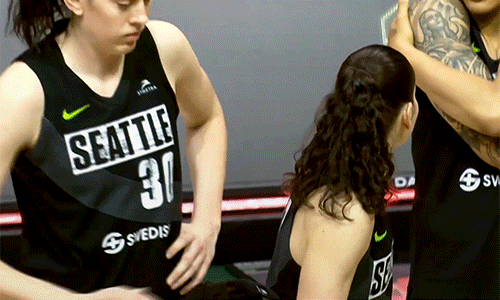
here's the full gifset for that
we all famously know sue credits stewie for fixing her shot in that all time performance of hers in game 5 of the 2018 semis, how it was her who noticed something was off and told her to use her legs more and the rest was history on that, just good looking out by stewie
random silly moment but when stewie got a cut on her neck during a game back in 2018 they had to stop play for the blood and stewie is just aggressively swiping at her neck and sue comes over like stop it let me do it 😭

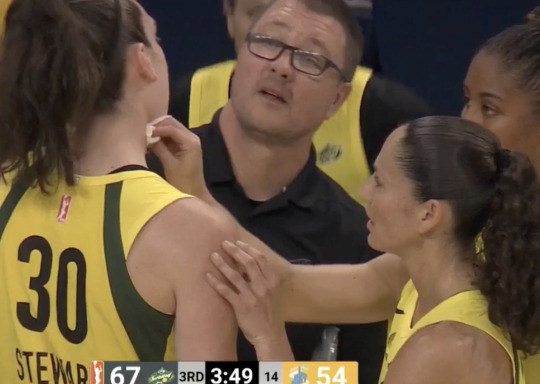
when sue broke her nose thanks to stewie's elbow hitting her in the face, the rest of the game stewie was so noticeably rattled even the commentators started speculating about it and then there's this moment on the bench when sue comes back, stewie's clearly got the red teary eyes before she has to check in and sue's the one trying to comfort her but also get her focused back on the game even though she's the one with gauze stuck up her nose 😭

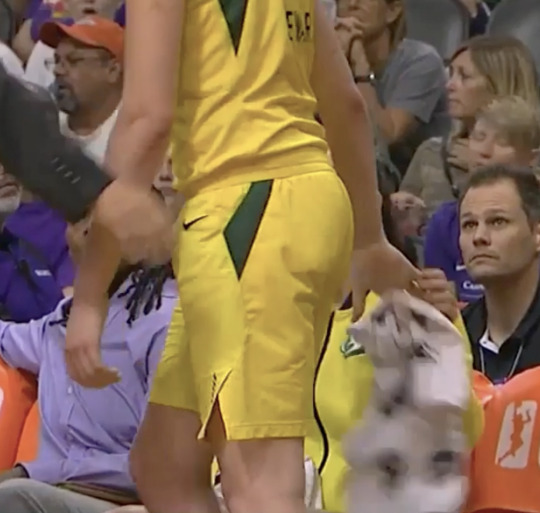
they also just would talk A BUNCH on the bench during games I have multiple clips from games over the years of them just being obnoxious as hell or blabbering away on the bench omdfgh
ANYWAY OTHER MOMENTS. when stewie hurt her achilles she mentions in probably one of my fave interviews that sue was one of the first people that texted her, she said she told her "I knew on your face something was wrong, usually you fall and you get right up" + after her surgery when she still wasn't mobile enough, she mentioned in another that sue and megan would come over and cook dinner for her. got massages for her, too. below is from one of my fave articles (more from that article when you scroll down as well) and like... this girl 😭 she was devastated 😭
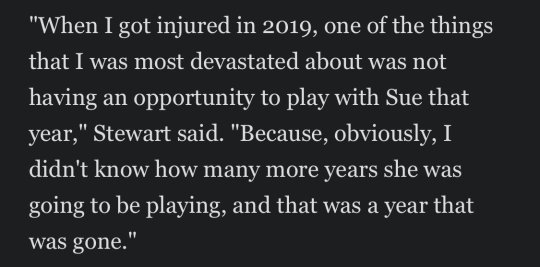
but sue ended up out for that year as well and it ended up producing this cute little exchange though 💀
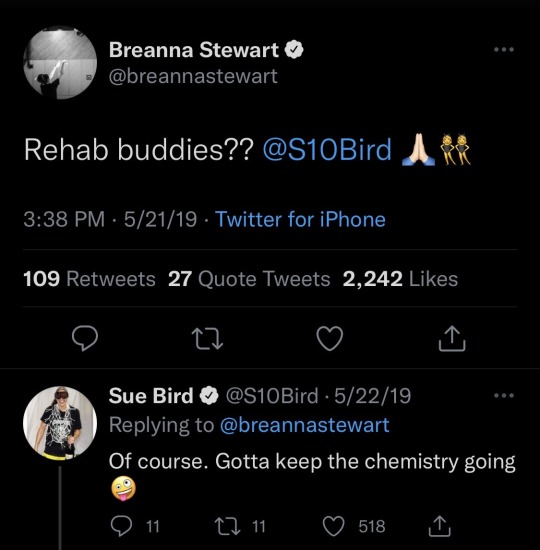
when she injured her OTHER achilles in 2021, sue mentioned stewie looked at her and mouthed 'uh oh' and she kinda knew then, and stewie later talked about how she wanted to keep playing but sue was the one who kinda brought her down like you need to think about the long term, not right now. and I just think all of that really shows the deep connection and trust there and stewie even talked about how they ended up understanding each other in ways others can't. here are some of the other screencaps from the article I mentioned above back in 2020:
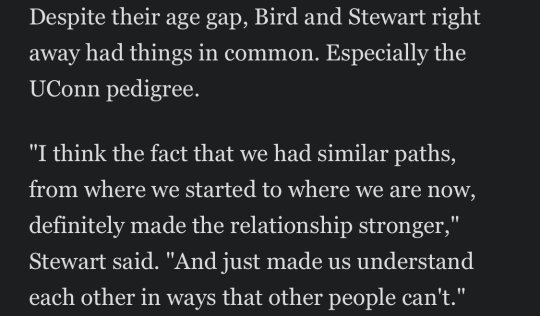
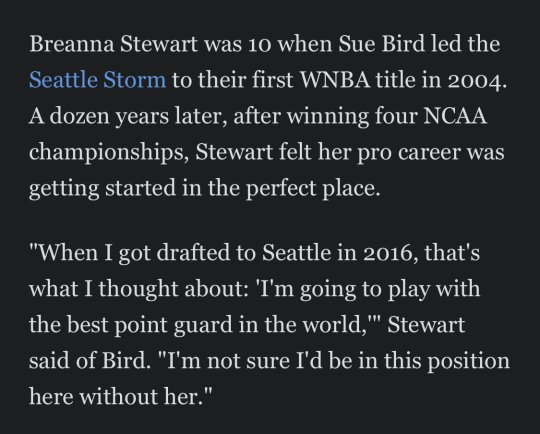
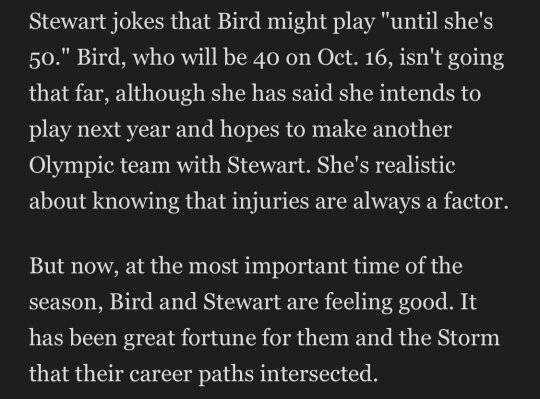
stewie has talked a lot about how she believes she wouldn't be where she is without sue. making players cry is kind of unfortunately holly rowes thing but stewie's interview back in 2018 before the finals, talking about sue and how much she deserved another championship and how she's done everything for her is very sweet. and here's that again from an interview before the start of this season:
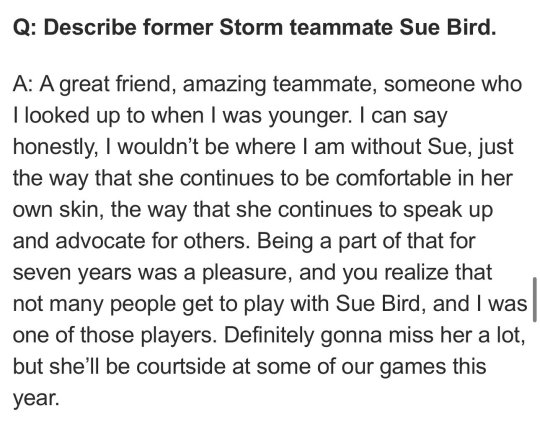
and that isn't one sided, sue's 2018 player's tribune piece before the finals lives in my head rent free, it's better than any poems ever, just
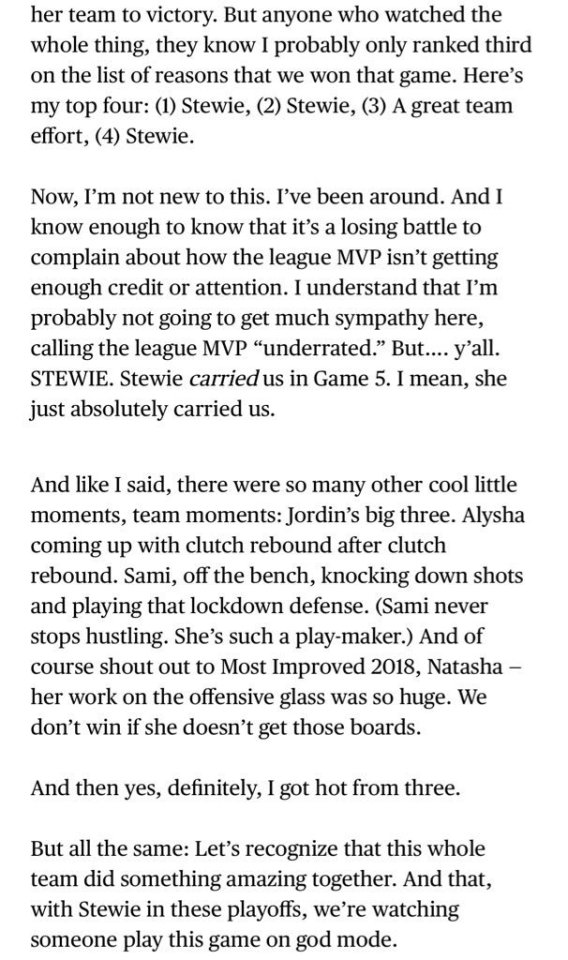
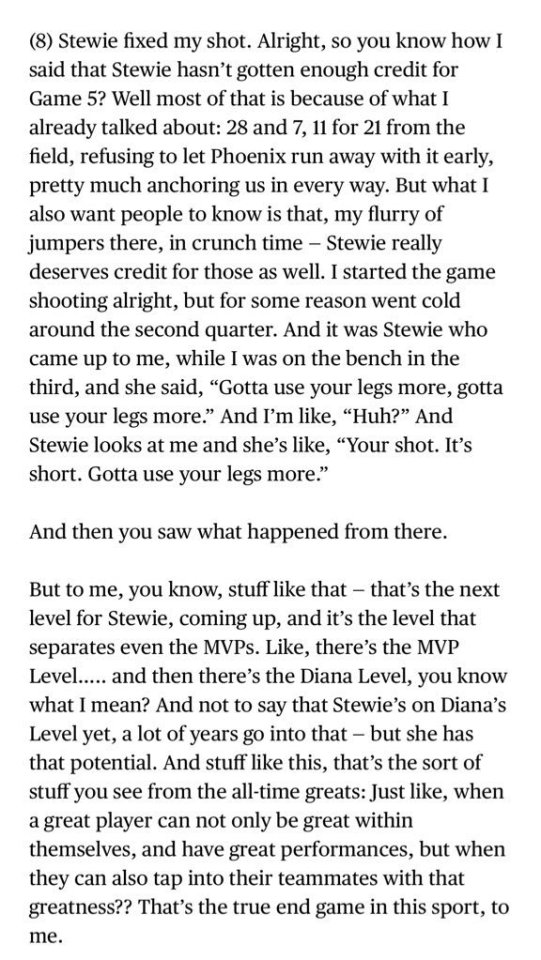
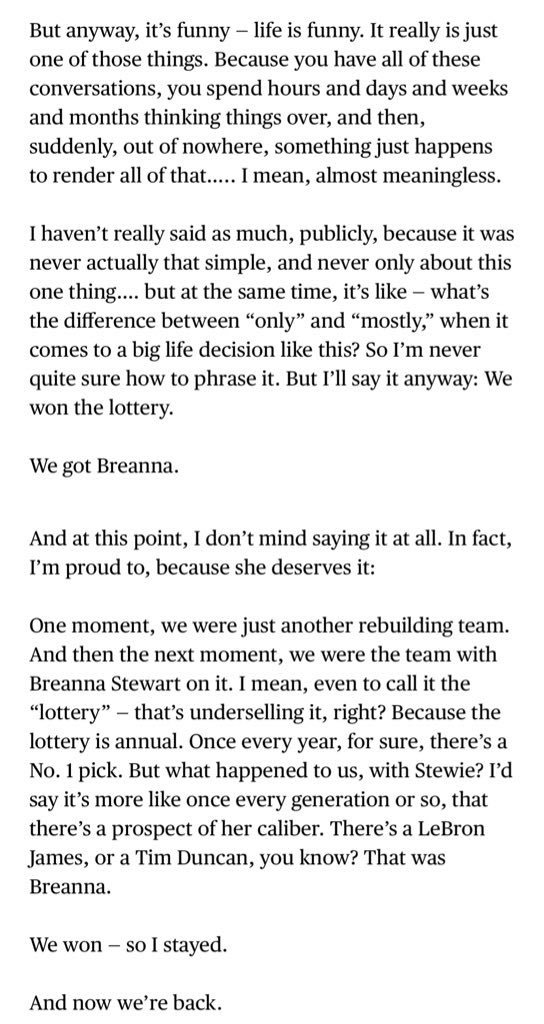
and in a poscast post bubble/championship she mentions how she hadn't said it to her face yet that she saved her career, and then in an interview in late 2021 she talked about it again that she was weighing her options of retire or go play somewhere else with a chance to win, and then they got stewie, and


here's the gifset I made for that
going to throw in some random social media things to break up the sweet and sentimental stuff because these two are hilarious idiots (there's still some sweet things too)
these are from stewie's snapchat back in 2017 😭
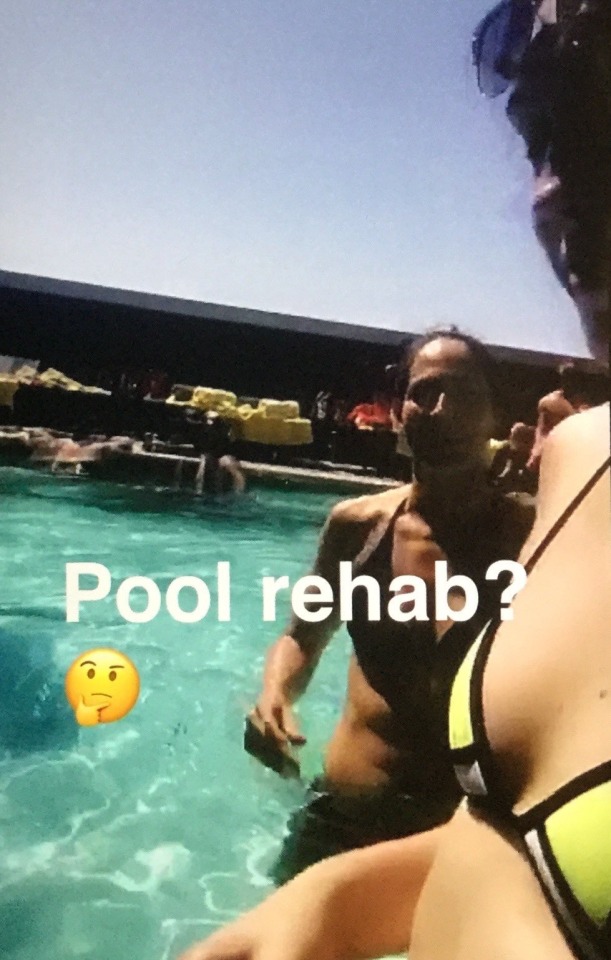
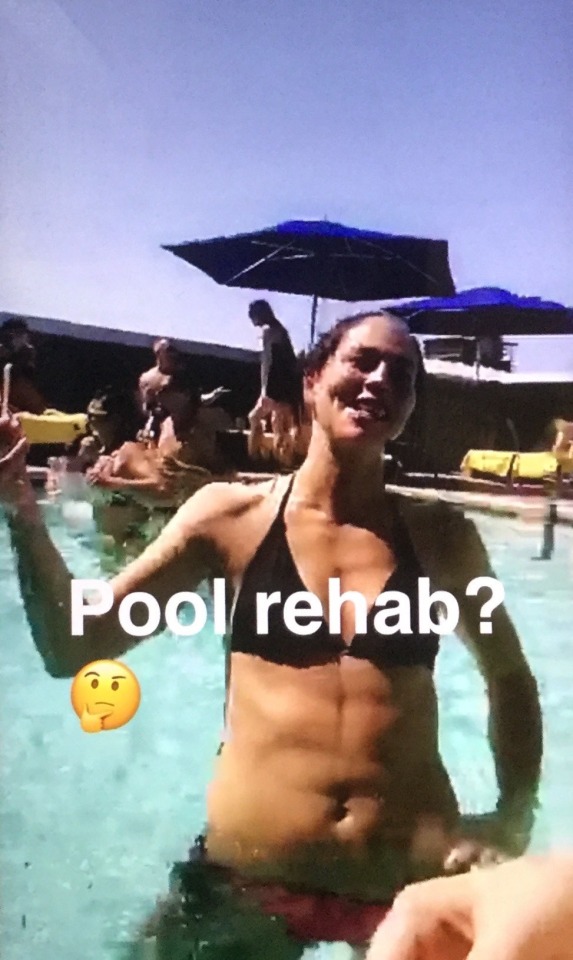
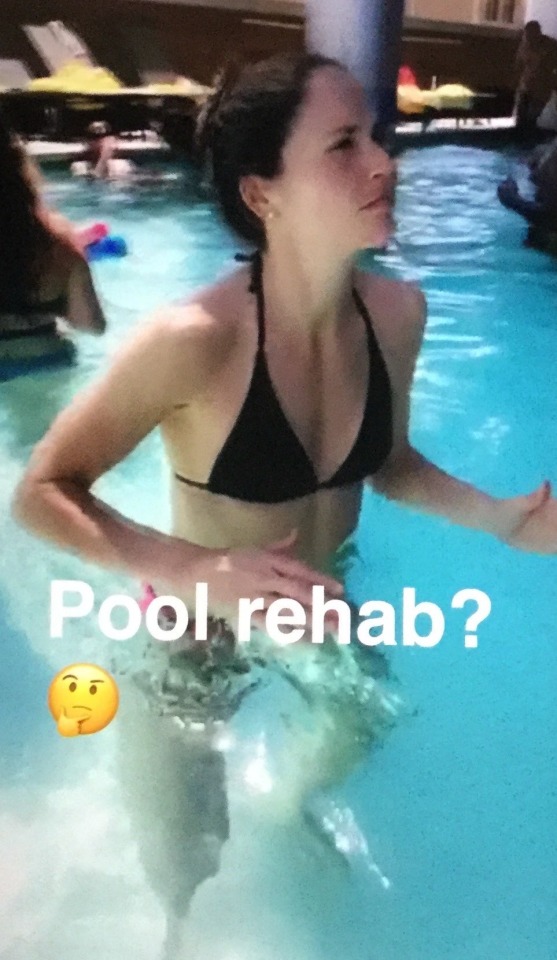
again they're weird and silly and thanks for giving the sue gays a heart attack with this one stewie

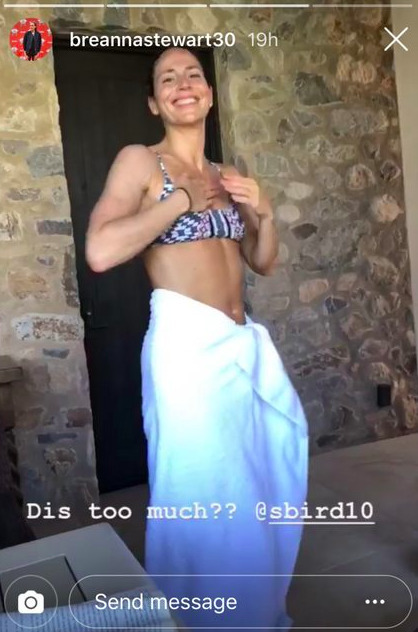
THERE'S THE SWEET DOSE
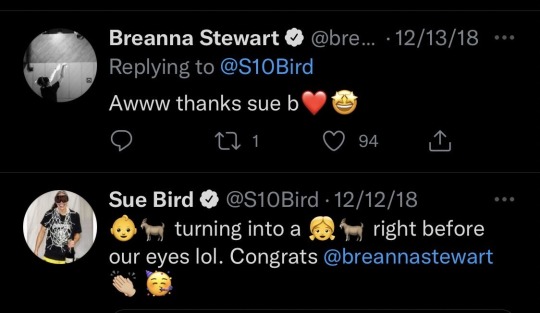
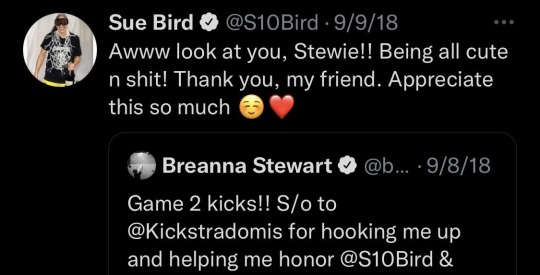
and then there's these... 😭
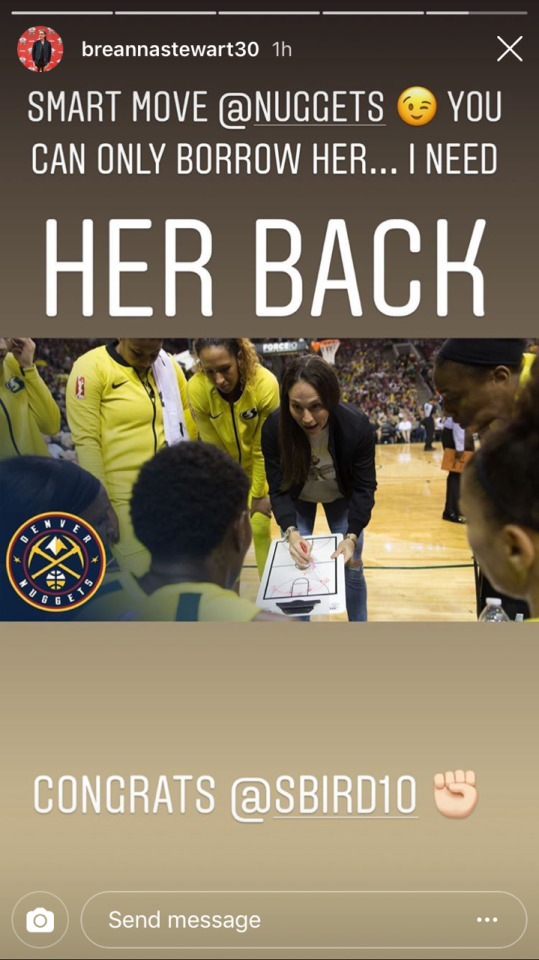
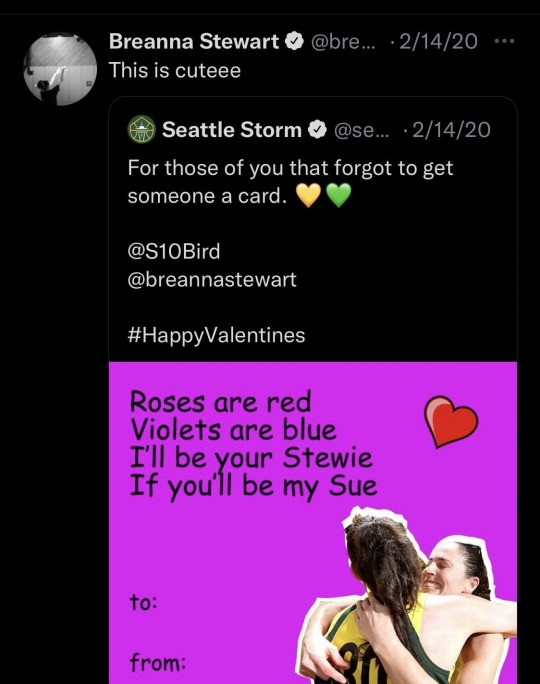
that's where I'll wrap it up maybe because this has gotten long enough and there's just so many more I'd be happy to share if you like, and I'll leave you with some random cute pictures as well
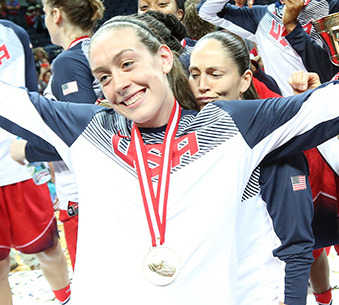
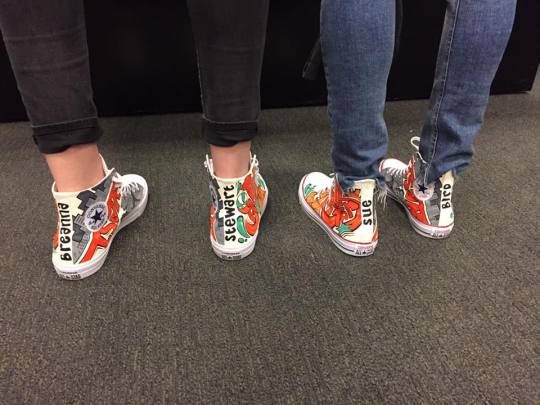
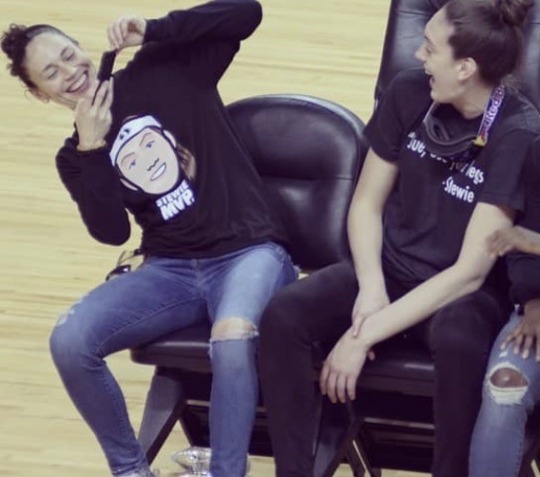
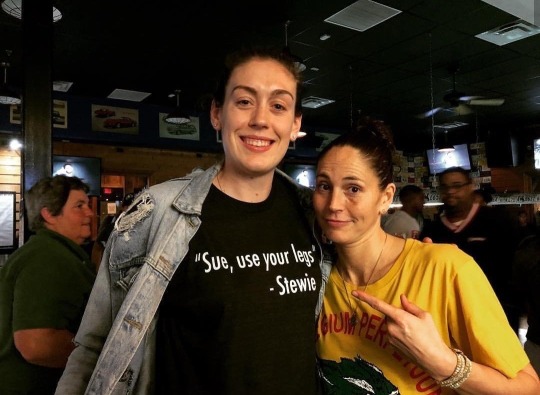
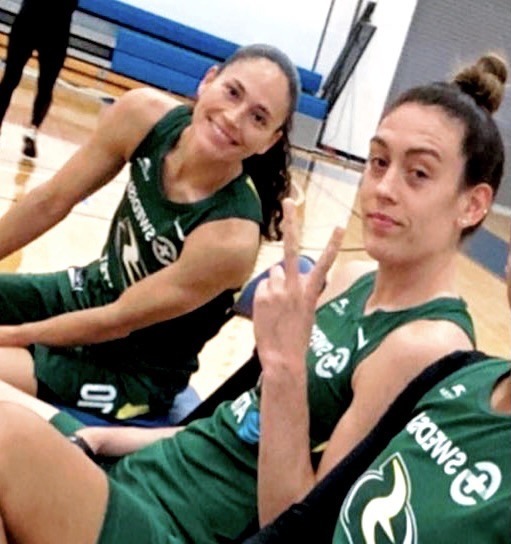
#breanna stewart#sue bird#wnba#mytext.jpg#I'M SORRY THIS GOT SO LONG#they're just so special and important to me#and there's still somehow tons of other stuff#sue and stewie#answered#anonymous
51 notes
·
View notes
Text
Olivia Baker doesn’t play behind anyone. She stands on her own. Her career path is proof of that.
Olivia’s mother is a lawyer, her father is a football player. Olivia chose journalism on her own. Nobody guided her in that direction. The show didn’t force her to be a lawyer like her mother. She chose her own dream. It was a passion and direction Olivia found all by herself. All on her own.
Olivia got her interview for the LA Tribune on her own. Her mother didn’t help her. Her father didn’t help her. Nobody even knew she applied. She went got that internship interview herself. On her own.
Olivia’s now boss said in the interview that she knows all about Olivia because she was impressed by Olivia’s podcast. Olivia’s podcast is something Olivia created all on her own in S2. Again, nobody guided her or gave her that idea. She made it all on her own. She built it all on her own. She worked on it all on her own. Nobody helped her with Liv The Truth.
Olivia wrote an article that had nothing to do with the assignment they gave her and they hired another writer who met the requirements of that assignment and created a whole new position for Olivia anyway because they liked what she wrote. She literally wrote off topic but it was written in a way that they felt they couldn’t lose out on a writer like Olivia even if she was writing off topic. Olivia got her first job off her writing and just her writing. Not her name. Not because she people pleased. She did the literal opposite. She was herself. She got it for being herself.
Olivia moved up from getting coffee to being allowed in pitch meetings because her pitch ideas were constantly being chosen for others to write and Spencer said most of the articles he sees he knows were Olivia’s ideas and Olivia said that’s something only they know because they aren’t written by her. They have yet to give her an assignment where she writes with her name on it. She had to work towards that. And she did.
Unmasked By Olivia Baker was her first published article. With her name.
Olivia made up the name “Jayden Davis” because she wanted the work to be seen and speak for itself and protect her loved ones from the backlash and even with a made up name, Olivia broke LA Tribune records, was trending, was picked up by 8 several different news stations and then was nominated and won an award for excellence in sports journalism off an article that wasn’t even tied to her or being Billy Baker’s daughter. The eyes on her article with a made up name. It could have flopped because who is that? Jayden Davis don’t even go to GAU. They had no idea who it was. Billy Baker wasn’t even in the equation. Just her work. And her work shined just as bright. Her first ever award in the field she chose herself was something she can honestly say she earned on her own with her own writing and not because she’s Billy Bakers daughter and that makes her more trustworthy in the sports journalism world or gave her her start. It can never be said she got attention because of him.
Olivia doesn’t just stand on her own, she thrives on her own.
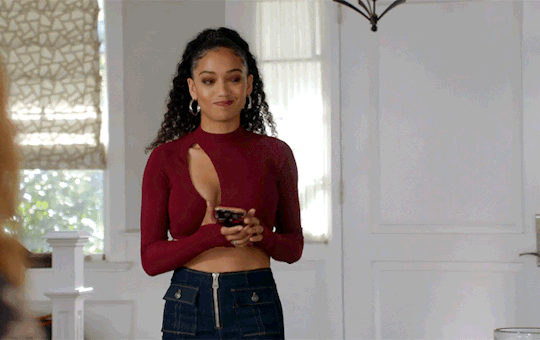
#all american#olivia baker#samantha logan#remove baker and she still shined#she knows that#she was trying to claim her dad not the other way around
34 notes
·
View notes
Note
hi! since the off season is dragging and i miss the devils - what are you favorite moments for each player (or select players) from this season, not just goals or plays but an interview, soundbite, off ice moment, anything
(missing pk big time because he always posted fun team content)
hiya anon, this was a fun one, thank you! this got, Long, so i'm gonna put it all under the cut (alphabetized, not ranked, and definitely not comprehensive)
kevin:
not like one thing in particular but playing more regularly this season! especially the second half
yanking multiple guys around casually
this was more last season but there’s a bunch of guys in utica that, every time he goes over the boards for a shift, chant a call-and-response of “who’s out?” “bahls out!” and it is beautiful
nate:
the video of him and johnny in seattle
this one of him nearly getting taken out by a football
also he’s seen the memes he loves the love
boqy:
a lil cuddle, or two, or three
i’ve always said he’s the devils’ morgan frost so i’m just very glad he’s found some semblance of a role this season he’s very neat to me
bratter:
hatty!
big hat hat!
him and nico reaching milestones together talking about how special it was,
more cuddles
notably too cute to be good at chirping
gravy:
carshield commercials - ïf you don’t call now, your wife should stop loving you.”
for some reason his goal in the oilers game early in the season stands out? keeping the winning streak alive!
smacking nico’s ass on a driveby
[30 seconds of uncomfortably polite staring as the sm admin waits for him to complete the heart]
dougie:
the six flags promo, wild that that was this season it feels like ages ago.
those few games where we kept going 4v3 in ot and dougie just kept scoring gwgs, iconic, showstopping.
fully lifting bratter like a foot? off the ice?
herding a flock of dudes
signing off the camera with a “hi grandma”.
floor time!
the movie re-enactments? wheres his oscar
haula:
“this is where i want to be. this is my family” <3
single handedly bringing us timo.
getting hit with a chicken finger
facing the other way on the bench when we went to shootouts (one of us).
laughing curling up on the floor instant fetal position
nico:
there’s. so much. because i’m nothing if not biased.
“i’ve just got a good feeling”
pumping up the crowd
selke finalist! career high in goals, assists, points!
being absolutely dominant in the rangers series.
game 5 nico chants!
[gestures vaguely at 1386 tag]
having the time of his life with some kids toys
marner’s “i felt good until nico decided to take me for a walk”
“siegyyyy! don’t worry everyone siegy is here!” <3
“let’s not forget to have fun. stick together. whatever happens.” + all the pre/post game speeches during the playoffs.
nate talking about how nico made him feel like he belonged + so much more
“he cares more about his teammates than probably does about himself”
timo facetiming him because he was anxious about the trade
jack
“oh shit :d”
hatty!
devils win for hanukkah :)
“yeah i knew that”
“those are quinn’s boys so--”
whatever him and pk were on at all-star weekend
“i want that record”
“we are off on our chemistry today, hey?”
looney tunes ass fall
[gestures vaguely again at 1386 tag]
nothing but respect for my lady byng finalist
the dance
all the hugs
luke
first goal! ot winner!
dream dinner guests: julius caesar and george washington + getting chirped about it by dawson
the entire exit interview, all of it - messy but working on it (lie, probably), doesn’t know what day it is, hasn’t retained a thought for more than 5 seconds, fidgety
marino
[looking at a children’s toy] look i’m not not saying this looks like a bong
him and gravy giggling after they pushed pally off the ice
dawson
the players tribune article
hatty!
setting the franchise record in consecutive games with a goal
the hair, it’s majestic
yegor
santagovich
a pet bird, named ham
throwing shit at sevo
messing with the camera lights during bratter’s interview
messing with tuna during his interview
vv
made friends with a bird :)
consistently referring to himself as “the vitek”
every time akira makes a big save vitek gives huge taps over the board <3
#i feel like i forgot a bunch of stuff#so maybe i'll come back to this and update it who knows#asks#anon
28 notes
·
View notes
Note
I think Leon is glad that the guys won yesterday, but I'm afraid that what Kimmich said after WC will happen to him. Josh said that it seemed to him that the national team was playing badly because of him and he was afraid of falling into a hole…It can be the same with Leon, because Leon used to play an important role and everything was bad. now Nagelsman has chosen other players and it works…this may have a bad effect on his remaining season in Bayern. I blocked the dfb and all media accounts and just don't read or watch anything, I hope Leon did the same, he needs peace now
Right? I’m sure that even if it’s bittersweet for him, it’s still more sweet than bitter. I have no doubt Leon wishes he could be there celebrating with the team, but at the end of the day, like every national team footballer, he’s a fan first. If they’re succeeding, I’m sure he’s proud of them.
But it’s like you said; I worry about him too. I still remember that Players Tribune interview Jo did, where he talked about how deeply the World Cup defeats affected him mentally. The heartbreak was still plain on his face. To hear that he blamed himself for the team’s poor performances when they weren’t his fault—when football is a team sport—was absolutely gut-wrenching. I don’t want the same thing to happen to Leon; I don’t want him to spiral into self-blame and self-doubt.
Don’t get me wrong, a little bit of self-blame can be healthy if it motivates you to work harder and keep growing. But it’s a slippery slope—blame yourself too much and you can find yourself in a rut, afraid to even try because what’s the point doing so. To blame yourself is to dance along a razor’s edge.
The more I watch this whole situation unfold, the more I think you must need some of the thickest skin in the world to thrive as a professional footballer. After all, like you said, Leon’s the perfect example; he played at a time when the national team played poorly, poorer than anyone would’ve expected from Germany. And then, when he was left off the team, everything seemed to improve. It must be unimaginably hard not to come away thinking you were the one holding the team back the whole time—as though it’s all your fault. It must be harder still to avoid getting stuck in that rut—to not let situations like that affect your performances at club level.
Truth be told, I don’t know what the rest of the season holds for Leon. Will he be able to keep up his string of good performances, or will the despair and self-doubt start to eat at him? Only time will tell. One thing I know though? Leon needs our support, now more than ever. When we’re at our most vulnerable, a little bit of love goes a long way.
Side note, but it can’t have been easy to block the dfb on social media, so I’m really proud of you for doing what you needed to do for your mental health <3 I hope Leon prioritizes his mental health too; he needs time to process everything and recover, just like any of us would.
5 notes
·
View notes
Text
Overcoming Differences
Note on the text: I used Matt Singer’s Opposable Thumbs: How Siskel and Ebert Changed Movies Forever as published in 2023 by Putnam
In many ways this is a real life version of the “enemies to friends” trope that we’ve seen a million times. For many people the show Siskel and Ebert became a part of their consciousness in the same way a show such as Mister Roger’s Neighborhood did or Friends. It even helped people deepen their love and appreciation for the movies as a whole which makes it interesting to read more about the people who put the show together, especially it’s two stars Roger Ebert and Gene Siskel.
Now as the real world equivalent of frenemies like Charles Xavier and Magneto it’s important to talk about just how much they hated each other in the beginning. They could not stand each other and saw each other as bitter rivals. They worked at competiting Chicago newspapers (Roger at the Sun-Times and Gene at the Tribune) and were working on establishing their respective reputations in the relatively niche world of film criticism while being almost the same age (Roger was only four years older than Gene). In fact when they first met to discuss starting the show in 1975 everyone commented that they did have chemistry- it was just the kind that “causes glycerin to explode when it’s mixed with nitric and sulfuric acid” (2). For whatever reason they knew how to set each other off and more often then not, especially in the beginning, they would do just that. They competed over everything, both on and off the screen. They fought with each other over everything from the title of their show, to who got the bigger interviews for their respective papers, to where to order lunch from that day, to who was the better critic. It irked Gene to no end that Roger won a Pulitzer Prize for film criticism in 1975 (just before the show got picked up) and he never did, and you can easily see how this rivalry was there ever since these two Midwesterners started reviewing films in the 1960s. Roger first joined the Sun-Times as their critic in 1967 and not long after, in 1969, the Tribune hired Gene to become their own film critic, a move which Roger perceived as
a deliberate attempt by the paper to compete with him head on. . . . Shortly after Siskel got the job at the Tribune, he even started using stars to rate the movies he reviewed. Previously, Ebert had been the only critic in Chicago to use such a system. These developments left Ebert certain: Siskel was explicitly hired to knock him off (2).
In his own way Gene also viewed Roger as a rival although he needed no motivation to do so. In fact one of Gene’s roommates at Yale said that Gene was the most competitive person he had ever known. Even more than “Michael Jordan or Bill and Hillary Clinton. So if Roger viewed him as an adversary that was just fine with Gene who always loved a good contest. Now he had one: destroy Ebert” (2-3). So for as successful as the show wound up being, putting these two together definitely came with its own set of risks. This could have absolutely blown up in the worst way possible. And it almost did.
The pilot episode was, by and large, a disaster. In fact the only thing that everyone appears to agree on all these years later is that the only thing that became increasingly clear while filming that first episode was that the two stars hated each other and wanted nothing to do with each other. It fell to producer Thea Flaum to figure out how to get the show’s two star players to play together as a team: “there was no chemistry. They didn’t even like each other. . . . But they had a style of relating to movies which both of them loved. They were good critics and very smart” (5-6). Then all of a sudden everything changed. About nine minutes into the first episode Roger made on offhand commented about the Chicago International Film Festival which had just concluded its eleventh year that changed everything:
I can remember when it could have been held in a so few people turned up’ . . . [and] without skipping a beat Siskel shot back ‘I can remember when some of the films they showed deserved to be shown in a back room.’ [Yea,] and they probably were [shot] there too.’ Ebert replied (6).
It was in that moment that Flaum realized that with the right guidance her two stars could learn how to play as a team, and that this team could go really far. Because as much as they hated each other they understood each other and the understood how to play the game. Which is to say that they knew how to talk about the movies.
The answer about how to get them to play on the same team was a relatively simple one: allow them to bond on screen over the one connection that they shared: their love of the movies. Prior to that moment Roger and Gene had seen each other rivals, as bitter enemies to be crushed and thrown out. But as time went on, and more specifically as the format of the show changed enough such that all the time and attention was focused on the conversation that those two people were having about the movie in question, they actually grew to understand and respect each other more and more, and eventually became friends. They even started to look forward to what the other person had to say about certain films. They became such good friends in fact that when the Tribune decided to demote Gene, Roger became his biggest advocate saying that he was “angry about the way they were treating him after years of loyal service” and even lobbied for the Sun-Times to hire him (175). Gene, talking in 1998, in talking about his relationship with Roger said “I think there’s a lesson there which is that you should be encouraged to meet your competitors, to engage them because you can learn from them, be stimulated by them. I enjoy these discussions. It sharpens both of us (273). What their show did on a macro-level was show how two bitter rivals could choose to bond over their mutual love of films and both be better off because of it.
0 notes
Text
September 1936: A Busy Month
Sept. 1, 1936: Couples of fans’ dreams
Will super-masculine Clark Gable marry super-feminine Mae West?
Probably not, but you’d be surprised how many movie fans think it would be a swell idea.
Kibitzing the motion picture marriage market is apparently the favorite indoor sport of t those who take film players seriously enough to write letters to and about them. Several hundred during the past month have urged Mae to flee altar-ward with the virile Gable, and vice versa….
Fans are often ignorant of actors’ currently marital ties or blithely disregard them.
William Powell’s followers apparently won’t rest until he marries Jean Harlow, Mary Brian, Elizabeth Allan, Madge Evans, Steffi Duna, Joan Blondell, Tallulah Bankhead, or his ex-wife, Carole Lombard.
Sept. 1, 1936, retrieved from The San Bernadino County
Sept. 2, 1936: Honest Romance
The studios themselves serve as matchmakers for prominent young players and are quick to take advantage of the romances that spring up voluntarily.
Jean Harlow and William Powell might have been teamed in “Libeled Lady” even if they were not so much interested in each other off the screen. But with the situation as it is, the picture is expected to have double appeal for the fans.
Take Robert Taylor and Barbara Stanwyck! There’s a perfectly honest romance which was promptly capitalized on by casting the two in “His Brother’s Wife.”
And Clark Gable and Carole Lombard: There’s no question about their mutual enchantment being of spontaneous origin, because they’re under contract to different studios.
The strategists of each movie company exercise every precaution to promote and nurture romances between stars of their own constellations so that they can be put together in pictures and that publicity may not be shared with rival concerns.
Sept. 2, 1936; retrieved from Marshfield News Herald
Sept. 6, 1936 – The Daily Oklahoman
In addition, myriad rumors are linking in expected matrimony the names of Clark Gable and Carole Lombard, Robert Taylor-Barbara Stanwyck, Jean Harlow-William Powell, Loretta Young-Eddie Sutherland, Merle Oberon-David Niven, Ronald Colman-Benita Huma, and Eleanor Powell-Jimmy Stewart.
It would be interesting to find out what the fans think of this wholesale renunciation of celibacy, whether they prefer their screen heroes and heroines married or single.
Sept. 7, 1936 – El Paso Herald
Wife files answer to Clark Gable suit; Motion reveals no divorce action planned by couple
Clark Gable and his estranged wife do not contemplate obtaining a divorce, Mrs. Gable disclosed today in her answer to the screen star’s suit for court interpretation of an informal property settlement.
The Gables have been separated for more than a year.
Sept. 7, 1936 – The Mercury
Clark Gable and Carole Lombard glimpsed whispering this and that in a Hungarian lunchery…
Sept. 10, 1936 – The Morning Call
Clark Gable has sworn off bow ties, reportedly because Carole Lombard likes four-in-hands and presented him with dozens…
Sept. 12, 1936 – The Los Angeles Times
(Sheilah Graham column)
Two Stars Discover Their Temperaments Differ
Clark Gable and Carole Lombard have discovered their temperaments differ too widely to allow of friendship.
Incidentally, most of Clark’s friends have remarked that since the separation from his second wife, he has been exceedingly morose and cynical.
Sept. 15, 1936 – Stevens Point Journal
Friends of Miss Helene Knope of Stevens Point, who now is a special correspondent in Hollywood, will be interested in her interview with Clark Gable and her account of his diet, which she sent to the Stevens Point Journal.
Her story is as follows: “Speaking of that Clark Gable-Carole Lombard romance, it seems to be in full swing…”
Sept. 16, 1936 – The Salt Lake Tribune
(Jimmy Fidler column)
I accept more seriously than most the rumors of an ultimate marriage of Carole Lombard and Clark Gable.
This is why: In the first place, I think Carole is more than willing. In the second place, at a shooting range the other evening I asked Clark if he intends to marry again. “Sure,” he answered. “Why not? I’m normal.”
“What sort of woman will your next wife be?” I persisted.
He ceased firing, lowered the gunbutt from his shoulder, and said, “A woman who can make me laugh.”
How well Carole Lombard fulfills the requirement!
Sept. 18, 1936: Actors’ habits
The next time you see Carole Lombard on the screen, notice whether she twirls a cigarette between her first two fingers and her thumb.
Watch Clark Gable twist his neck in his collar, as if the collar were too tight.
See whether Spencer Tracy wrinkles his forehead too much; he thinks he does.
Every star has some idiosyncrasy in his screen mannerisms which he is constantly striving to correct and which he sees again and again as the picture is put on the screen.
Sept. 18, 1936; Retrieved from Standard Sentinel
Sept. 19, 1936: Partner swap
“MY MAN GODFREY” – William Powell and Carole Lombard, who had wanted to play together in a picture when they were married to each other, finally got the opportunity now that they are divorced. Carole and Powell are very friendly and both enjoyed the association.
Clark Gable often called for Miss Lombard after work, and William Powell would hurry to Miss Harlow. Strange indeed is the fact that Carole Lombard and Clark Gable appeared in a picture together, “No Man of Her Own.” Then Miss Lombard would leave the set to join her husband, William Powell.
“My Man Godfrey” was written by Eric Hatch, from a short story by him, and the screen play was done in collaboration with Morrie Ryskind, who is the co-author of that Pulitzer prize play, “Of Thee I Sing.”
Sept. 19, 1936; retrieved from NY Daily News
Sept. 19, 1936 – The South Bend Tribune
Carole Lombard today joined the parade of actresses who have adopted their screen names legally. The blond star, whose real name is Jane Peters, is having her attorney draw up a court petition to have Carole Lombard made her legal name.
Sept. 20, 1936 – The Des Moines Register
The “Valentine Ford” which CAROLE LOMBARD gave CLARK GABLE as a joke has received so much publicity Gable has had it painted black so he can use it without paralyzing traffic.
Sept. 20, 1936: Company picnic
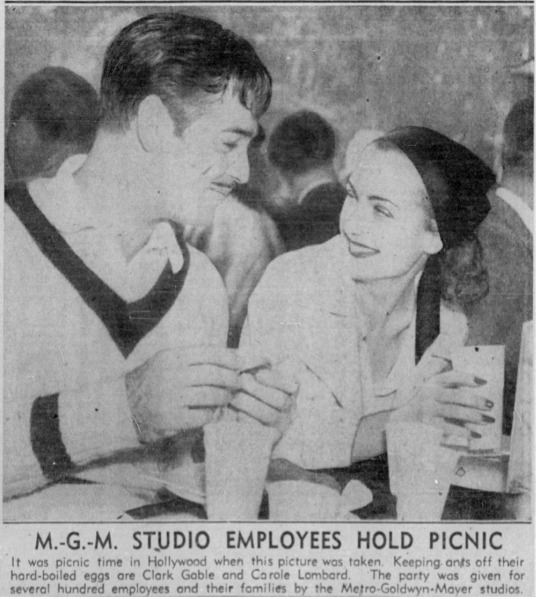
MGM Studio Employees Hold Picnic
It was picnic time in Hollywood when this picture was taken. Keeping ants off their hard-boiled eggs are Clark Gable and Carole Lombard. The party was given for several hundred employees and their families by the Metro-Goldwyn-Mayer studios.
Sept. 20, 1936; Retrieved from The Los Angeles Times
Sept. 22, 1936 – Star Tribune
CAROLE LOMBARD is demanding a very substantial increase in salary, or she will not sign her new contract with Paramount…
Sept. 23, 1936 – The San Francisco Examiner
PARAMOUNT is moving heaven and earth to borrow Clark Gable from MGM to costar with Carole Lombard in “Exclusive.”
The studio heads feel that, due to their muchly publicized romance, the combination would ring the box office bell such as it did with Robert Taylor and Barbara Stanwyck in “My Brother’s Wife.”Paramount, by the bye, will probably soon be on a very large borrowing spree, along with all the other studios, since no less than twenty films are being held up at the moment because of a dearth of leading men. It seems like a pretty good time for freelancers.
Getting back to Miss Lombard, her stock since “My Man Godfrey” has shot practically to the top of the ladder, since “Godfrey” has broken all existing box office records in Los Angeles and is starting out to repeat same in New York.
Sept. 24, 1936 – Pittsburgh Post Gazette
Clark Gable and Carole Lombard had more fun than anyone at the M-G-M picnic recently…
Sept. 26, 1936: Day at the Fair
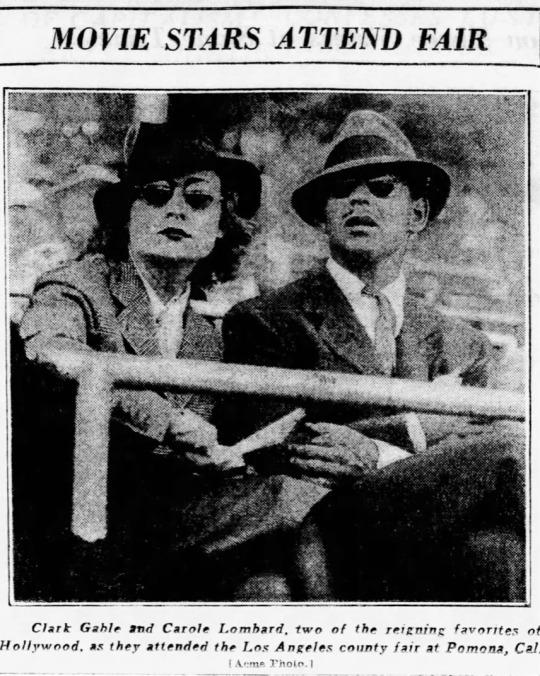
MOVIE STARS ATTEND FAIR - The Chicago Tribune
Clark Gable and Carole Lombard, two of the reigning favorites of Hollywood, as they attended the Los Angeles county fair at Pomona, Cal.
Sept. 26, 1936 – Pittsburgh Post Gazette
That handsome couple at the Pomona Fair was none other than Clark Gable and Carole Lombard…
Sept. 26, 1936 – Detroit Free Press
Hollywood can get excited about the darndest things. Such as Carole Lombard riding around in a certain car, of a certain type and paint job, which everyone “knew” belonged to Gary Cooper. And the Coopers are supposed to be so happily married, too.
Well, it turned out that Carole was doing nothing of the sort. Said car was owned by Clark Gable, who has a perfect right to loan it to his friend. It happens to be an identical model of an automobile that Gary Cooper owns. But it stops right there, with the Coopers still very happily married. And Clark Gable and Carole Lombard still good friends.
Sept. 26, 1936 – The Los Angeles Times
Two “Romances” Not Serious
Sources close to all parties concerned say there is little likelihood that the current “romances” featuring Carole Lombard and Clark Gable, and Bill Powell and Jean Harlow, will end in the altar. None of them appears to be marriage minded at the current writing, although both twosomes find each other’s company enjoyable and go around together a lot. However, a woman has a right to change her mind – and a man, too, for that matter.
Sept. 29, 1936 – The Spokesman
(Sheilah Graham column)
Clark Gable and Carole Lombard decided to patch up their quarrel for the sake of the joint box they owned for last week’s Pacific southwest tennis tournament.
Another interested observer at the matches was Mrs. Rhea Gable, who spent most of the time looking sadly at the husband from whom she is separated and his blond companion.
Sept. 29, 1936 – The Miami News
Over the Teacups
Carole Lombard, who temporarily lost her title as Hollywood’s most outspoken femme to Arlene Judge, has won it again, under the gentle tutelage of Clark Gable. Clark, in his better moments, can beat any longshoreman at his own game of verbal fireworks, say his friends. And no fish-wife that ever was (say her enemies) can hold a candle to Carole when it comes to verbombast.
Sept. 29, 1936 – Honolulu Star
The Clark Gable-Carole Lombard romance is not quite made to order for movieland’s purposes, Gable is an MGM player and Miss Lombard is at Paramount. Paramount has been trying to borrow Gable to team him in a picture with Carole and MGM has been trying to borrow Carole for the same purpose. These efforts having failed, both studios made the best of the situation by allowing a third studio, Universal, to use the two stars together in My Man Godfrey. (Note: Confused writer??)
Another stunt is to cast divorced couples together and to hint about possible reconciliations. This was done with William Powell and Carole Lombard and with Margaret Sullavan and Henry Fonda. No such reconciliations have, however, developed.
0 notes
Note
"Ora Washington: The 'queen of two courts' whose brilliance was ignored" By Renee Montgomery2× WNBA champion & Atlanta Dream co-owner <3 here is the link (take out spaces) bbc. com/sport/63066765
In terms of her place - her rightful place - in sporting history and the public consciousness, that slipped away. So much so that when in 1976 the Black Athletes Hall of Fame sought to honour her, they didn't even know she had died.
In 1969, two years before Washington's death at the age of 72 or 73, she was interviewed by Len Lear for a story with the Philadelphia Tribune. They met back where it all began for her: at the Germantown YWCA. Lear, now a veteran reporter for that newspaper, had never heard of her.
"Once I met her and asked a lot of questions, I was absolutely floored," he says.
"It's just hard to imagine this today when you see people like Serena Williams, for example, making countless millions and having their name on perfume and all kinds of other products. And she had nothing. Nothing. She was getting old and she was not in great health, but to learn that she was possibly the best female athlete in the country in the first half of the 20th century [and] she was doing housekeeping... She did not express anger or rage specifically. She was more or less, I would say, sad. Over what could have been and should have been. She wanted to be recognised for her skills by everyone, and she wasn't."
Washington's great nephew Gregory Price has another view. He doesn't remember her as sad.
"My sister and I are essentially the last living members of our families who knew her personally, who had actual personal contact with her. We're the last of that," he says. "You know, she seemed looming large, larger than life. She was tall and slim, she had a baritone voice and beautiful eyes. And when she looked at you, you saw sincerity in her eyes when she spoke.
"My aunt Ora was homosexual, we had no problem with her sexuality… [but] she was reclusive because of that, so I would imagine those who knew of her sexuality suppressed her accomplishments when she was at her best. They adored her as a player but off the court they refused to acknowledge her because of her sexuality. They refused to, even the Black community, let alone the white community because of racism back then. If she was alive today to see the changes that have taken place - racially, ethnically, sexually, she would be proud to say stand up and say: 'Yes, I'm gay.'
"This is nothing short of a hidden figure story. Someone who played two sports at the highest level, was a champion in both of those sports. [Larry] Bird, [Michael] Jordan, Magic [Johnson]… none of those guys can speak to that. Nobody in sports history.
"Anyone after us, they'll only know her through stories we now tell. I feel like that's my call to action. Tell the story, and the facts will speak for themselves."
(continue reading)
–
I can't help but wonder how many brilliant women were suppressed the way Ora was.
8 notes
·
View notes
Text
Whumptober No. 5
betrayal / misunderstanding / broken nose
(Hockey AU)
***
He’d always thought the night Jay took the picture would be the worst of it.
Buck’s hands were clutching the rails of Jay’s iron headboard, where Jay had wanted them, where Jay had placed them after stripping Buck of his clothes, saying “Don’t let go.” His slow, sexy, predatory smile was the last thing Buck saw before the silky black blindfold was tied in place. Jay was gone after that, climbing off the bed, telling Buck how good he looked and what he thought he might do and Buck had arched into the words until he was begging to be touched.
“Be patient,” Jay had purred, appeasing Buck with a single finger drawn shiveringly down his thigh. Buck could feel that he’d climbed back onto the bed, but Jay was too far away and he wasn’t teasing; he just wasn’t there. Stretching out longer on the mattress, trying to find him, he’d said, “What’s going on up there?”
Then the flash went off, the bright light cutting through the thin fabric of the blindfold. Jay swore, “Shit. Fuck,” and when Buck let go of the bed with one hand (one hand because maybe he misunderstood, maybe it was fine, maybe he’d laugh and put his hand back and they’d-)to push the tie away, he’d seen Jay, crouched above him with his phone in his hand.
If he’d asked, Buck might even have agreed. He liked posing. He liked having his body appreciated. But Jay’s expression was the alarm of being caught red-handed and Buck knew, knew with a sinking feeling of dread and betrayal, that Jay wasn’t just taking a memento to savor later. He was taking a picture of Rangers center Evan Buckley, naked, smirking, and vulnerable, to use exactly the way those kinds of pictures get used.
Buck forced Jay to delete the photo, made him prove that he’d done it, and then had somehow managed to get himself dressed and down to the street to get a ride without throwing up. His face burned the whole drive home and for half of the night.
And that was the worst of it until five years later. In a new city. When Buck was finally playing the way he’d always known he could. When he was finally earning the respect of his team and the hockey world at large. When he started thinking he might stay. That was when the anonymously authored post was retweeted and reblogged and shared and gleefully discussed on all corners of the hockey internet.
MY WILD NIGHT WITH AN NHL ALL STAR
The Good, the Bad, and the Kinky
His agent’s was the first text he saw when he got done with practice: “Do NOT respond yet. Call me first.”
It had taken another couple messages before Buck realized what he wasn’t supposed to respond to and in the meantime, the texts kept rolling in. Half of them from numbers he didn’t even have saved in his contacts.
“Dude, is that shit true?”
“Are you okay?”
“Do you know who it is?”
“You dog 😜”
“You never told me you were into that 👀”
“Ignore it, Buck.”
“We’re all with you.”
“Fuck that guy.”
“Hey if you need something to take your mind off of it💋💋💋”
“Evan, Mike from the Tribune. If you want to set the record straight, please give me a call.”
From the looks on the faces of his teammates as they tried to pretend they weren’t stealing glances at him, they were getting messages of their own. Hen was the first one to start to approach him with a look of concern, but Buck avoided her, grabbing his bag and sneaking out the door without bothering to hit the stationary bike like usual.
“What the hell did you do to piss this guy off?” Geoff said as soon as he answered Buck’s call. “More importantly, what else does he have on you?”
“Nothing!” Buck answered, nearly merging directly into another car as his hands shook on the steering wheel. “What do I do? How do I fix this?”
“I don’t know, Buckley. None of my other clients get up to shit like this. You need to get yourself a publicist. I’m going to get in touch with Grant and make sure they’re not already shopping you.”
His agent hung up and Buck’s phone continued to buzz and chime all the way back to his apartment.
There were cameras outside which there almost never were. Mostly only hockey fans cared about pictures of hockey players and the press was limited to the arena and their official events. Maybe one or two regular guys who Buck knew by name. It was just his luck that he lived in LA where there were almost more cameras than there were disasters to photograph.
“Buck! Do you know who the author is?”
“Have your teammates seen the post?”
“Are you worried about other former partners coming out with similar stories?”
Buck pushed past them, but the questions followed him inside. His phone didn’t stop. His mentions were a nightmare on every platform. He shut Twitter as soon as he opened it and saw his name in the trending topics. The statements put out by the Kings and Buck’s agent condemning the piece and the interest in it were drowned out by outlet after outlet picking up the post and sharing it out wider and wider.
Can you guess this NHL player by his sexcapades? (Hint: It’s exactly who you think)
Hockey players used to be the humble, hard working gentleman of sports. What happened?
Should the Kings trade Evan Buckley? Can they?
Nash should make Buckley sit for embarrassing the team like this.
Aw, man, don’t do that. Sitting’s a little tough for Buckley right now
🤣
And I thought it couldn’t get worse than the time he fucked that mascot in Carolina
{This post may contain explicit content}
😵💫
🤮
Excuse you, Gritty has standards
[98 more posts]
Whether from a latent masochistic streak or just because he didn’t want to look away and find that the story had gotten bigger while he was gone, Buck couldn’t stop refreshing the pages. He read Jay’s words over and over again as his stomach roiled. If it had all been lies, Buck wouldn’t have spent the morning pressed into the corner of his couch, hoodie pulled up over his head like armor. If it had all been lies, he could have made a fiery statement, condemning the mystery author and condemning everyone who thought they had a right to consume and critique another person’s sex life.
There were some lies, of course, but it was true enough that Buck’s heart clenched with it. True enough that he could remember how he felt when it was happening, during the three times they’d been together before the photo. Soft and desired and joyful. There was a part of him that was still exposed to Jay, that always would be, this man with the sharp wit and the sharp smile who got Buck bare, begging and biddable all to make him a joke. As he read the smug asides in the unforgiving narrative, he could hear Jay’s voice in his ear.
The sixth time he read it, there was an addition.
Edit: Ha ha wow this really blew up. Doing an AMA at 6 eastern if you’re looking for more dirty details.
And for the first time, Buck felt the burn of tears in his eyes. Furious. Powerless.
The buzz of his phone started making his skin crawl so he shoved it between the couch cushions and tried not to think about it. He sat with his knees pulled up to his chest and his arms wrapped tightly around, rocking just a little as he felt panic creeping in.
What else could Jay possibly have to say? Would he make up more and more audacious lies as long as he had an audience? Would an NHL team want to touch Buck when he was done?
Were there more pictures?
It was the fourth night, the night that Buck caught Jay. Not the first night with the blindfold. What if? Buck shuddered, sinking lower, deeper into the couch, folding himself tighter and smaller, trying to crush the mounting, hopeless fear. He was there for a long time.
When the gentle knock hit his door, Buck jumped and then crouched tighter into his ball. He didn’t answer. There was no one he could face right now.
The knock came again.
Then the door opened.
Buck was up like a shot, nearly falling over the coffee table as he whirled around toward the intruder. Eddie stood in the doorway, holding up one empty hand and pulling his key out of the door with the other.
“Just me.”
“What are you doing here?” Buck asked, shoving his hands into the pocket of his hoodie to hide the fact that he’d been digging his nails into his palms for the last hour.
“Well, you took off. And you weren’t answering your phone.”
Hot shame flushed across Buck’s skin. Eddie knew. Eddie had seen the article and the articles about the article and the tweets about the articles and been shouted at by the cameras outside and Buck wanted to sink into the floor.
“Notice you didn’t take the hint.”
The attitude in Buck’s response didn’t faze Eddie at all, “Do I ever?”
And that almost made Buck feel like smiling, because no, no he didn’t. He said, “No. But there’s always a first time.”
Eddie came a little further into the apartment and Buck felt crowded. Eddie always seemed to take up so much space around him. Maybe it was just that Buck felt his presence most strongly than anyone else’s. Especially when he was like this: arms crossed, focused, not letting Buck wiggle out of a conversation that he didn’t want to have.
This time was no exception. When Buck turned and went back to the couch, compulsively refreshing the comments on Jay’s post again as he went, Eddie followed right after him.
“I came by to make sure you were okay,” he said and Buck flinched again, hating that Eddie knew. Hating that the team knew.
“I’m fine,” he answered, keeping his eyes down and away from Eddie. “Coach is going to rip me a new one tomorrow, but my agent hasn’t called me to tell me I’m being traded so yet so I guess that’s-”
“Who the fuck said you were being traded?” His voice was loud enough that Buck looked up, surprised to see the intensity of anger in Eddie’s face.
“THN. NHL Network did a round table on it too, but they didn’t think anyone would take me. Oh, then Kirk Davis did a radio interview.”
Everyone had picked up those soundbites. Even through the heavily bleeped broadcast, the future hall-of-famer’s opinion on Buck had been crystal clear. At least that wasn’t new information for Buck. Davis had all but refused to shake Buck’s hand when he first joined the Predators and was a big part of why his tenure there had only lasted until the trade deadline.
“Kirk Davis is a fucking asshole. There’s a reason they never made him captain.”
“He’s not the only one who said it.”
“Then he’s not the only fucking asshole out there.” When he didn’t respond, Eddie came around the couch to stand face to face with him, noticing the open comments page as he did. “Christ, have you been reading that shit all day?”
Somehow it made Buck laugh. “It’s the same shit I’ve been reading for 8 years. Since I got drafted. Buckley’s a distraction to his team. Buckley’s an embarrassment to the game of hockey. Buckley cares more about getting laid and partying than he does about winning. It’s guys like Buckley that hurt the NHL.”
His voice pitched up as he recited the familiar accusations, staring somewhere over Eddie’s shoulder because Eddie already knew all this about him. Eddie was the opposite of Buck in every way. He would never make himself the center of attention. He’d never do anything to make his teammates ashamed to play with him. He’d never be so stupid as to go home with a guy like Jay.
“Buckley’s finally getting what he deserves.” Buck whispered.
“Look at me,” Eddie said. When Buck couldn’t, Eddie reached out, setting a light hand on his shoulder that got tighter when Buck tried to shrug out of the hold. “Hey. Look at me.”
He moved his head into the space where Buck was staring into the middle distance and waited. Until Buck couldn’t help but flick his gaze to meet Eddie’s. Once he did, he found a furious compassion that startled him.
“You don’t deserve this, Buck. You did nothing to deserve this. It is not your fault. Nobody in our room thinks it is. Bobby doesn’t think it is.”
Buck shuddered under the weight of the words. He wanted to pull himself free and he wanted to step in closer, “My agent told me I should own it. Post a couple thirst traps and a middle finger on instagram and just wave it off like another classic Evan Buckley weekend.”
There was a time when he would have. Times when he had. But this wasn’t a ridiculous paparazzi photo outside a bar, it was… It was private. It hurt.
As if reading his mind, Eddie said, “That’s not what this is. Fire him if he wants to make you pretend this is okay.”
“I just keep thinking if I was anyone else. If I was someone good, they’d all go after him and not me. I didn’t even do anything to him, Eddie. I didn’t-”
Before he could finish his sentence, Eddie tugged him forward and his arms were tight around his back. Buck should have tried to fight it, but he couldn’t help but fall against his chest and cling on. “You are someone good,” Eddie said, making Buck’s breath hitch. “And if you weren’t, it wouldn’t matter. It’s wrong. They’re wrong.”
“I shouldn’t have trusted him,” Buck confessed into the soft fabric of Eddie’s shirt. “I was so stupid back then. I just wanted- I wanted him to like me. And I’m still- It still hurts that he didn’t. How fucked up is that? He did this. And I still just wish he liked me.”
One of Eddie’s hands moved up to cradle the back of Buck’s head. They were swaying, just a little, Eddie rocking them gently. “I know,” he said. “I’m so sorry.”
He managed to keep from crying, but Buck couldn’t stop his breath from coming out in soft, stuttering gasps. Couldn’t keep his fingers from digging into Eddie’s back. If he thought about it, he could imagine this post too (Evan Buckley cried like a baby on my shoulder AMA), but Eddie would never do that. The warm heat of him against Buck’s chest was like a blanket hiding him from the world. It was the most vulnerable he’d been all day and the most sheltered.
Eddie didn’t let go until Buck pulled back and even then he didn’t go far, “Have you eaten since practice?”
“I didn’t think I’d be able to without throwing up,” Buck said honestly.
“Do you want to order something from-”
The timer on Buck’s laptop shrieked and they both jumped. Eddie recovered quickly, but Buck’s heart leapt into his throat. He’d almost forgotten. How could he have forgotten? Pulling away from Eddie, he turned off the timer and refreshed the post, looking for the link he knew would be there.
“Come on, Buck, really?”
Eddie reached out to slam the laptop closed, but Buck shoved his hand in the way. “I have to, Eddie. He’s doing an AMA. I have to-”
“I’m not going to let you torture yourself reading what a bunch of sick assholes have to say, Buck. No way.”
“I have to.”
“No, you-”
“Yes, I do!” He shouted it, standing up to look Eddie in the eye. “I have to read it. I have to see it now because if- if- if I wait and it gets reposted- I have to know if he has- I have to-”
“Buck,” Eddie said, putting his hands on Buck’s arms, trying to rub calmness back into him even as Buck’s heart-rate accelerated. “What does he have? What could be worse than what he already-”
“Pictures,” Buck yelled. “I have to know if he has pictures.”
A dark, dark look came over Eddie’s face and he stopped rubbing Buck’s arms to squeeze instead. “You think he has pictures?” he asked.
“I don’t know,” Buck whimpered. He saw himself as if from above, stretched out long and lewd against Jay’s sheets. He imagined ten thousand other people seeing it. “He took- I caught him taking one. Once. But I don't know if it was the only one. I don’t- I can’t let them get out. If he has them, I have to know. I have to report the post. I have to-”
“No,” Eddie said.
“Yes, Eddie. I have-”
“I hear you. Okay? I hear you, but I’m not letting you do that. I’m not letting you put any more of that garbage in your head.”
“Eddie.”
“I’ll do it. I’ll report every goddamn post.” Lifting one hand, Eddie stroked a thumb softly along Buck’s hairline. “Let me do it. Let me protect you.”
Buck swallowed hard, fear and relief and longing fighting for control of the tears that were building up again. He didn’t want Eddie to see any of that. He didn’t want Jay’s words in Eddie’s head. But Buck really really didn’t want them in his own. He wanted someone to protect him. “Thank you,” he said, falling forward again to rest his head on Eddie’s shoulder.
“I’ve got you,” Eddie replied, rubbing his hands firmly up Buck’s back.
Eddie wouldn’t let Buck sit on the couch while he monitored the thread. He fished Buck’s phone out of the couch and made him answer the important messages. From Maddie. From Bobby. From Hen and Chimney. Then he’d told him to order food from the Lebanese place they always ordered from when Eddie came over, asking for extra of the pickled turnips. All the while, Eddie’s fingers slammed onto the keyboard, that sound the only reaction he gave to any of the posts.
It should have been unbearable, letting Eddie comb through the messages. Even without seeing them, Buck knew what they were like. He blocked people every week for the same kind of thing. But Eddie had a defense against them that Buck never had: he didn’t believe they were true. Not even a little bit. He didn’t believe there was a chance that Buck was getting what he deserved for being a show off, for never being a points leader, for being open and soft hearted, for being himself. Eddie believed Buck deserved to be protected and he was ruthless about it.
“No pictures,” he said, a while later, when Jay had finally stopped replying to every comment on the page. “And the rest of it is… well. It’s nothing new.”
“Really?”
“Really. I think it’s done.”
Eddie closed the laptop as if by making that gesture of finality, he could make the words true. Buck, allowed back on his own couch, let himself believe it too. Let himself lean into the safety of Eddie’s arm over his shoulders, breathing in a deep sigh of relief as they caught the Canucks game.
The next morning, Jay’s story was hardly anywhere to be seen. It was replaced. By an essay in The Players’ Tribune. It excoriated Jay. It called out Kirk Davis by name and hundreds of online posters by their bad intentions. It praised Buck’s grace, tenacity, and backhand shot and it demanded respect and compassion and privacy from anyone who called themselves a hockey fan. And it wasn’t anonymous.
#whumptober2021#no. 5#betrayal#fic#911#hanging out at the angst end of the spectrum#911fic#evan buckley#eddie diaz#hockey au#allison can’t write a short fic to save her life#minimal edits#messy ending#questionable formatting#230 am#😴
61 notes
·
View notes
Text
The Player's Tribune: I will never forget the tears I shed that day
Article published 25 March 2021, originally written by Yuki Tsunoda in Japanese.
I translated the article with help from Google Translate and Naver Translator + my own interpretations of their rubbish translating, so apologies in advance for any mistakes! Anything I had trouble translating will be bolded with a (?) next to it!!
I think that was the last time I cried in frustration, in regret.
Four years ago, I was only 16 years old and was a student at Suzuka Circuit Racing School. It was the final selection to join Honda's Driver Development Program. If I pass, I can run in Japanese F4 the following year, but if I failed...I was thinking of quitting racing at that time.
Now, I'm standing at the entrance of the stage called F1. Looking back, that was the turning point of my life.
Of course, I didn't know if I would pass that year's trial because there were not only those who had already run in F4 but also some drivers who had come back from overseas.
However, I've been racing in karts since I was four years old, and I've been doing well. That year, I was the youngest ever podium finisher in my debut race in the Japanese F4 championship, which allowed me to participate in the spot (?) race, and won the Super FJ Japan's first championship. At the selection test, there were good results until the final round of selection, and I was in a position to compete for first and second place overall. So I thought I could afford to make a big mistake in the final selection, and I was confident that I would still be in the top two in the end.
I am a strong driver. But if you can't get results here or if you can't fascinate the judges with your running, it's already known (?). So I was prepared to give up my racing career if it didn't work. I think there were many other routes to go, such as running in other training programs or non-formal races, but I don't like it when it's not the direction I want to go. I decided to live a different life rather than to do it half-heartedly.
However, the worst result awaited. At that time, I was very weak mentally and, of all things, it showed in the final round. Even before the race, I found myself tense and stiff. My fingertips were also stiff. I was not my usual self. I started like that, but suddenly I was flying...I had to drive through the pitlane and then rejoin the course. I felt like I was running alone, far away from the previous group. I felt sorry for myself, and I didn't even feel like running anymore. As a result, the points in that race were almost zero, and Tsunoda lost in the final round.
I was so frustrated that tears welled up naturally on the train home. It was the first time since I started racing in earnest. I was the youngest among the participants, but I was shocked because I was confident that I wouldn't lose, and I couldn't imagine anything even if I tried to think about the future. I still remember clearly that I was so depressed that I didn't even want to see my parents on my way home from the Shinkansen.
But there was only one faint hope. That was what the then Honda F4 coach said in an interview after the screening.
"As a training driver for Honda, you will not be able to participate in the race next year, since the Formula 4 Honda has four cars. Maybe I can put you in one of the remaining two cars running as Suzuka Racing School."
That was because former Formula One driver Satoru Nakajima recommended me. Mr. Nakajima was the principal of the school at that time, and at the time of the final selection, he was watching us run in the final chicane.
I was given a penalty at the start, and I was racing without emotion, but I was running hard so that I wouldn't regret it. Through the visor, I saw Satoshi Nakajima standing in the final corner. I didn't want to show Mr. Nakajima a careless run. It was a hopeless ranking, but I thought I should not give up until the end and keep running toward the group in front of me. Then the road opened.
In 2017, Suzuka Racing decided to enter me into F4 instead of making me a training driver. Then, I suddenly ranked 3rd overall in the annual overall ranking, and the following year in 2018, I was selected as a Honda Formula Dream Project driver, and was able to become the champion.
It's all because I was frustrated at that final selection.
The most unusual thing is that I think it's mental. Until I had a setback, I had a feeling that I would do well until the end without doing anything. I knew I wasn't good at starting even though I failed in the previous round, and I had time to practice before that, but I didn't. There was something sweet about overconfidence. And at that time, I was afraid of making mistakes, so I didn't know how to grow up.
After failing the selection, I realized that I was still not perfect and that I had to be faster. I realized that it is important to make a lot of mistakes without fear of making mistakes, and to make new discoveries and grow from there. Therefore, I didn't feel impatient when I didn't get points as I wanted in the early part of the F3 and F2 seasons last year after I went abroad. Rather, there was no hesitation in the process of making a lot of mistakes first and learning a lot from them.
Takuma Sato, a former Formula One driver, now driving in Indycar, is famous for saying, "No attack, no chance," but I think that's exactly right. If you don't try beyond the limits of any sport, you won't find the future, and if you don't try, you'll stop there. Therefore, even if there are times when I make mistakes or get no results, I don't feel strangely distressed. Even if you make a mistake, it's up to you to take it. Mistakes make me want to investigate the cause. If you think that you can overcome it, you can be faster than if you regret the mistake, and you can always face it positively.
Now that I can race in F1, I feel grateful to my parents. I've liked to move since I was a child, and I played swimming, soccer, mountain biking, and also, not sports, but piano. Now that I think about it, I feel that my father and mother were letting me do what I was interested in. And the reason why I started driving karts was also influenced by my father. My father liked motorsports and played gym carna himself. One day, at the circuit venue I was taken to, I was allowed to drive a real cart. That was the first time. Actually, I also experienced a pocket bike at that time, but after trying two, I said, "The kart is more fun." I don't really remember at all (lol).
But there were times I got sick of karts...
For example, when I was about seven years old. When I was playing a game while waiting at the track, my father told me to "focus more on the race," and my game was taken away, and I felt like, "I don't like it anymore." Then my father became getting tougher and tougher on me to improve me, and he scolded me for many things. To be honest, I didn't really appreciate my father until I was 15, and there was a time when I hated him. 'This is "The Rebellion Period".' I think I was in the middle of it.
Not only my father but also my mother was strict in terms of academic matters. I was always told to study in case I didn't succeed in motorsports. My junior high school was not a public school (?), so after the race, I would go home on the day, get ready for school, go to school, study, and take the test. To be honest, it was hard and I never liked it, but I continued to study anyway.
At that time, I couldn't thank my parents, but now I have the opposite feelings. I think I am what I am now thanks to their harshness, scolding, and teaching me a lot of things back then. Thank you so much.
I didn't expect to be able to get to F1 this quickly. Not only are there few Japanese drivers, but they are also those taking the shorter route compared to foreign drivers.
When I first went to see F1 at Fuji Speedway at the age of seven, Lewis Hamilton and Fernando Alonso were running. At that time, I wasn't longing for it, but I thought "I wanted to race with drivers like this someday", and those feelings are still the same. Hamilton is already a legend, and it's an honor to run with him, but when I get on the circuit, both Hamilton and Alonso are just drivers. Think of them as enemies.
It's the same for Max Verstappen, who I think is the fastest and strongest opponent in Formula One, and Pierre Gasly, who's my teammate in Alpha Tauri. I want to know as soon as possible how well I can handle Verstappen and how well I can compete. Gasly was active in Japan's top-category, Super Formula, when I was running in Japanese F4, and I hope I can learn a lot of things from him, but I think he's also my biggest rival that I have to beat someday because we're in the same machine.
'In the world of F1, "speed" is ultimately required.' No matter how fast you say you are, if you show off your speed, you can make an impact, and if you have speed, you can get back in front in the second half even if you were overtaken or separated from the pack in the beginning of the race. However, it is actually the most difficult to show "speed" in a situation like this. My biggest strength is speed, so in addition to that, I want to learn more of what I lack.
Come to think of it, at an online conference held this off-season, my goal came out big like, "I'll be a Formula One champion more than seven times, the most ever tied," but that's not what I meant.
I haven't done a single race in Formula One yet, so I can't say that (bitter smile).
What I'm thinking about right now is to give the best performance I have in the first race, and to get as many points as possible throughout the season. Just like F2, even if you go up to F1, you will make a lot of mistakes from the beginning to the middle of the season, but I want to learn a lot by making new discoveries there. After saying such a thing at the press conference, there was a question like, "What is Tsunoda's ambition?" So I replied, "Maybe I'll win the championship seven times like Lewis Hamilton?" which became a big headline.To be exact, I really want to concentrate on everything in front of me now, and I hope that my ambition will come true as a result of that accumulated effort.
What kind of scene will I see in the future? I want to improve my ability and become a race driver representing the F1 world, and I think it will be a different pressure and motivation, so the expectations of the fans may be even higher.
That's why I want to never forget how I felt when I drove in Formula One for the first time in 2021. I want to cherish the current feelings of a rookie and continue to make mistakes to my heart's content, learn a lot from them, and enjoy them.
I don't think I'll shed tears like I did four years ago in the final selection. I will never forget the tears I shed that day. But if I were to cry from now on, what kind of tears would I have...?
I think it's realistic to say when I first win the championship. It's very difficult to get to Formula One, but it's going to be a tough road ahead. It's really hard to win, so if I'm going to shed tears, it's probably not "regretful tears" but "happy tears".
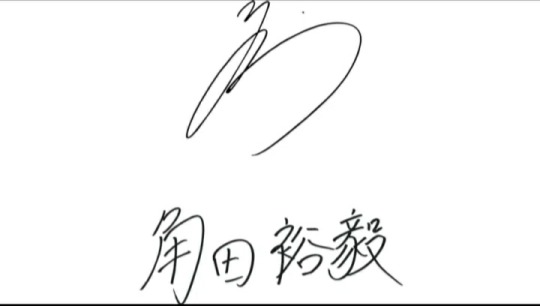
95 notes
·
View notes
Text
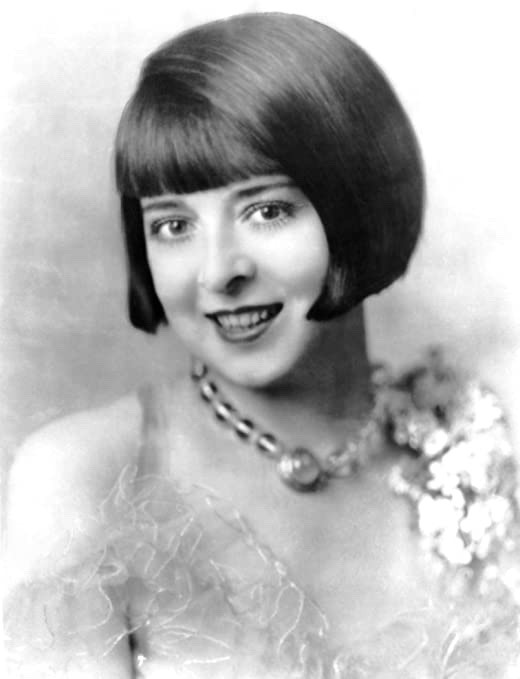
Colleen Moore (born Kathleen Morrison; August 19, 1899 – January 25, 1988) was an American film actress who began her career during the silent film era. Moore became one of the most fashionable (and highly-paid) stars of the era and helped popularize the bobbed haircut.
A huge star in her day, approximately half of Moore's films are now considered lost, including her first talking picture from 1929. What was perhaps her most celebrated film, Flaming Youth (1923), is now mostly lost as well, with only one reel surviving.
Moore took a brief hiatus from acting between 1929 and 1933, just as sound was being added to motion pictures. After the hiatus, her four sound pictures released in 1933 and 1934 were not financial successes. Moore then retired permanently from screen acting.
After her film career, Moore maintained her wealth through astute investments, becoming a partner of Merrill Lynch. She later wrote a "how-to" book about investing in the stock market.
Moore also nurtured a passion for dollhouses throughout her life and helped design and curate The Colleen Moore Dollhouse, which has been a featured exhibit at the Museum of Science and Industry in Chicago, Illinois since the early 1950s. The dollhouse, measuring 9 square feet (0.84 m2), was estimated in 1985 to be worth of $7 million, and it is seen by 1.5 million people annually.
Moore was born Kathleen Morrison on August 19, 1899, (according to the bulk of the official records;[4] the date which she insisted was correct in her autobiography, Silent Star, was 1902)[5] in Port Huron, Michigan,[6] Moore was the eldest child of Charles R. and Agnes Kelly Morrison. The family remained in Port Huron during the early years of Moore's life, at first living with her grandmother Mary Kelly (often spelled Kelley) and then with at least one of Moore's aunts.
By 1905, the family moved to Hillsdale, Michigan, where they remained for over two years. They relocated to Atlanta, Georgia, by 1908. They are listed at three different addresses during their stay in Atlanta (From the Atlanta-Fulton Public Library city directories): 301 Capitol Avenue −1908; 41 Linden Avenue – 1909; 240 N. Jackson Street – 1910. They then lived briefly — probably less than a year — in Warren, Pennsylvania, and by 1911, they had settled in Tampa, Florida.
At age 15 she was taking her first step in Hollywood. Her uncle arranged a screen test with director D.W. Griffith. She wanted to be a second Lillian Gish but instead, she found herself playing heroines in Westerns with stars such as Tom Mix.
Two of Moore's great passions were dolls and movies; each would play a great role in her later life. She and her brother began their own stock company, reputedly performing on a stage created from a piano packing crate. Her aunts, who doted on her, indulged her other great passion and often bought her miniature furniture on their many trips, with which she furnished the first of a succession of dollhouses. Moore's family summered in Chicago, where Moore enjoyed baseball and the company of her Aunt Lib (Elizabeth, who changed her name to "Liberty", Lib for short) and Lib's husband Walter Howey. Howey was the managing editor of the Chicago Examiner and an important newspaper editor in the publishing empire of William Randolph Hearst, and was the inspiration for Walter Burns, the fictional Chicago newspaper editor in the play and the film, The Front Page.
Early years
Essanay Studios was within walking distance of the Northwestern L, which ran right past the Howey residence. (They occupied at least two residences between 1910 and 1916: 4161 Sheridan and 4942 Sheridan.) In interviews later in her silent film career, Moore claimed she had appeared in the background of several Essanay films, usually as a face in a crowd. One story has it she had gotten into the Essanay studios and waited in line to be an extra with Helen Ferguson: in an interview with Kevin Brownlow many years later, Ferguson told a story that substantially confirmed many details of the claim, though it is not certain if she was referring to Moore's stints as a background extra (if she really was one) or to her film test there prior to her departure for Hollywood in November 1917. Film producer D.W. Griffith was in debt to Howey, who had helped him to get both The Birth of a Nation and Intolerance through the Chicago censorship board.
"I was being sent to Hollywood - not because anybody out there thought I was any good, but simply to pay off a favor".
The contract to Griffith's Triangle-Fine Arts was conditional on passing a film test to ensure that her heterochromia (she had one brown eye, one blue eye) would not be a distraction in close-up shots. Her eyes passed the test, so she left for Hollywood with her grandmother and her mother as chaperones. Moore made her first credited film appearance in 1917 in The Bad Boy for Triangle Fine Arts, and for the next few years appeared in small, supporting roles gradually attracting the attention of the public.
The Bad Boy was released on February 18, and featured Robert Harron, Richard Cummings, Josephine Crowell, and Mildred Harris (who would later become Charles Chaplin's first wife). Two months later, it was followed by An Old-Fashioned Young Man, again with Robert Harron. Moore’s third film was Hands Up! filmed in part in the vicinity of the Seven Oaks (a popular location for productions that required dramatic vistas). This was her first true western. The film’s scenario was written by Wilfred Lucas from a story by Al Jennings, the famous outlaw who had been freed from jail by presidential pardon by Theodore Roosevelt in 1907. Monte Blue was in the cast and noticed Moore could not mount her horse, though horseback riding was required for the part (during casting for the part she neglected to mention she did not know how to ride). Blue gave her a quick lesson essentially consisting of how to mount the horse and how to hold on.
On May 3, 1917, the Chicago Daily Tribune said: "Colleen Moore contributes some remarkable bits of acting. She is very sweet as she goes trustingly to her bandit hero, and, O, so pitiful, when finally realizing the character of the man, she goes into a hysteria of terror, and, shrieking 'Daddy, Daddy, Daddy!' beats futilely on a bolted door, a panic-stricken little human animal, who had not known before that there was aught but kindness in the world." About the time her first six-month contract was extended an additional six months, she requested and received a five weeks release to do a film for Universal's Bluebird division, released under the name The Savage. This was her fourth film, and she was only needed for two weeks. Upon her return to the Fine Arts lot, she spent several weeks trying to get her to pay for the three weeks she had been available for work for Triangle (finally getting her pay in December of that year).
Soon after, the Triangle Company went bust, and while her contract was honored, she found herself scrambling to find her next job. With a reel of her performance in Hands Up! under her arm, Colin Campbell arranged for her to get a contract with Selig Polyscope. She was very likely at work on A Hoosier Romance before The Savage was released in November. After A Hoosier Romance, she went to work on Little Orphant Annie. Both films were based upon poems by James Whitcomb Riley, and both proved to be very popular. It was her first real taste of popularity.
Little Orphant Annie was released in December. The Chicago Daily Tribune wrote of Moore, "She was a lovely and unspoiled child the last time I saw her. Let’s hope commendation hasn’t turned her head." Despite her good notices, her luck took a turn for the worse when Selig Polyscope went bust. Once again Moore found herself unemployed, but she had begun to make a name for herself by 1919. She had a series of films lined up. She went to Flagstaff, Arizona for location work on The Wilderness Trail, another western, this time with Tom Mix. Her mother went along as a chaperone. Moore wrote that while she had a crush on Mix, he only had eyes for her mother. The Wilderness Trail was a Fox Film Corporation production, and while it had started production earlier, it would not be released until after The Busher, which was released on May 18. The Busher was an H. Ince Productions-Famous Players-Lasky production; it was a baseball film wherein the hero was played by John Gilbert. The Wilderness Trail followed on July 6, another Fox film. A few weeks later, The Man in the Moonlight, a Universal Film Manufacturing Company film was released on July 28. The Egg Crate Wallop was a Famous Players-Lasky production released by Paramount Pictures on September 28.
The next stage of her career was with the Christie Film Company, a move she made when she decided she needed comic training. While with Christie, she made Her Bridal Nightmare, A Roman Scandal, and So Long Letty. At the same time as she was working on these films, she worked on The Devil's Claim with Sessue Hayakawa, in which she played a Persian woman, When Dawn Came, and His Nibs (1921) with Chic Sale. All the while, Marshall Neilan had been attempting to get Moore released from her contract so she could work for him. He was successful and made Dinty with Moore, releasing near the end of 1920, followed by When Dawn Came.
For all his efforts to win Moore away from Christie, it seems Neilan loaned Moore to other studios most of the time. He loaned her out to King Vidor for The Sky Pilot, released in May 1921, yet another Western. After working on The Sky Pilot on location in the snows of Truckee, she was off to Catalina Island for work on The Lotus Eater with John Barrymore. In October 1921, His Nibs was released, her only film to be released that year besides The Sky Pilot. In His Nibs, Moore actually appeared in a film within the film; the framing film was a comedy vehicle for Chic Sales. The film it framed was a spoof on films of the time. 1922 proved to be an eventful year for Moore as she was named a WAMPAS Baby Star during a "frolic" at the Ambassador Hotel which became an annual event, in recognition of her growing popularity.[13] In early 1922, Come On Over was released, made from a Rupert Hughes story and directed by Alfred E. Green. Hughes directed Moore himself in The Wallflower, released that same year. In addition, Neilan introduced her to John McCormick, a publicist who had had his eye on Moore ever since he had first seen her photograph. He had prodded Marshall into an introduction. The two hit it off, and before long they were engaged. By the end of that year, three more of her films were released: Forsaking All Others, The Ninety and Nine, and Broken Chains.
Look Your Best and The Nth Commandment were released in early 1923, followed by two Cosmopolitan Productions, The Nth Commandment and Through the Dark. By this time, Moore had publicly confirmed her engagement to McCormick, a fact that she had been coy about to the press previously. Before mid-year, she had signed a contract with First National Pictures, and her first two films were slated to be The Huntress and Flaming Youth. Slippy McGee came out in June, followed by Broken Hearts of Broadway.
Moore and John McCormick married while Flaming Youth was still in production, and just before the release of The Savage. When it was finally released in 1923, Flaming Youth, in which she starred opposite actor Milton Sills, was a hit. The controversial story put Moore in focus as a flapper, but after Clara Bow took the stage in Black Oxen in December, she gradually lost her momentum. In spring 1924 she made a good but unsuccessful effort to top Bow in The Perfect Flapper, and soon after she dismissed the whole flapper vogue; "No more flappers...people are tired of soda-pop love affairs." Decades later Moore stated Bow was her "chief rival."
Through the Dark, originally shot under the name Daughter of Mother McGinn, was released during the height of the Flaming Youth furor in January 1924. Three weeks later, Painted People was released. After that, she was to star in Counterfeit. The film went through a number of title changes before being released as Flirting with Love in August. In October, First National purchased the rights to Sally for Moore's next film. It would be a challenge, as Sally was a musical comedy. In December, First National purchased the rights to Desert Flower and in so doing had mapped out Moore's schedule for 1925: Sally would be filmed first, followed by The Desert Flower.
By the late 1920s, she had accomplished dramatic roles in films such as So Big, where Moore aged through a stretch of decades, and was also well received in light comedies such as Irene. An overseas tour was planned to coincide with the release of So Big in Europe, and Moore saw the tour as her first real opportunity to spend time with her husband, John McCormick. Both she and John McCormick were dedicated to their careers, and their hectic schedules had kept them from spending any quality time together. Moore wanted a family; it was one of her goals.
Plans for the trip were put in jeopardy when she injured her neck during the filming of The Desert Flower. Her injury forced the production to shut down while Moore spent six weeks in a body cast in bed. Once out of the cast, she completed the film and left for Europe on a triumphal tour. When she returned, she negotiated a new contract with First National. Her films had been great hits, so her terms were very generous. Her first film upon her return to the States was We Moderns, set in England with location work done in London during the tour. It was a comedy, essentially a retelling of Flaming Youth from an English perspective. This was followed by Irene (another musical in the style of the very popular Sally) and Ella Cinders, a straight comedy that featured a cameo appearance by comedian Harry Langdon. It Must Be Love was a romantic comedy with dramatic undertones, and it was followed by Twinkletoes, a dramatic film that featured Moore as a young dancer in London's Limehouse district during the previous century. Orchids and Ermine was released in 1927, filmed in part in New York, a thinly veiled Cinderella story.
In 1927, Moore split from her studio after her husband suddenly quit. It is rumored that John McCormick was about to be fired for his drinking and that she left as a means of leveraging her husband back into a position at First National. It worked, and McCormick found himself as Moore's sole producer. Moore's popularity allowed her productions to become very large and lavish. Lilac Time was one of the bigger productions of the era, a World War I drama. A million dollar film, it made back every penny spent within months. Prior to its release, Warner Bros. had taken control of First National and were less than interested in maintaining the terms of her contract until the numbers started to roll in for Lilac Time. The film was such a hit that Moore managed to retain generous terms in her next contract and her husband as her producer.
In 1928, inspired by her father and with help from her former set designer, a dollhouse was constructed by her father, which was 9 square feet with the tallest tower 12 feet high. The interior of The Colleen Moore Dollhouse, designed by Harold Grieve, features miniature bear skin rugs and detailed furniture and art. Moore's dollhouse has been a featured exhibit at the Museum of Science and Industry in Chicago, Illinois since October 30, 1949, where according to the museum, it is seen by 1.5 million people each year and would be worth $7 million. Moore continued working on it and contributing artifacts to it until her death.
This dollhouse was the eighth one Moore owned. The first dollhouse, she wrote in her autobiography Silent Star (1968), evolved from a cabinet that held her collection of miniature furniture. It was supposedly built from a cigar box. Kitty Lorgnette wrote in the Saturday, August 13, 1938 edition of The Evening News (Tampa) that the first dollhouse was purchased by Oraleze O'Brien (Mrs. Frank J. Knight) in 1916 when Moore (then Kathleen) left Tampa. Oraleze was too big for dollhouses, however, and she sold it again after her cat had kittens in it, and from there she lost track of it. The third house was possibly given to the daughter of Moore's good friend, author Adela Rogers St. Johns. The fourth survives and remains on display in the living room of a relative.
With the advent of talking pictures in 1929, Moore took a hiatus from acting. After divorcing McCormick in 1930, Moore married prominent New York-based stockbroker Albert Parker Scott in 1932. The couple lived at that time in a lavish home at 345 St. Pierre Road in Bel Air, where they hosted parties for and were supporters of the U.S. Olympic team, especially the yachting team, during the 1932 Summer Olympics held in Los Angeles.
In 1934, Moore, by then divorced from Albert Parker Scott, returned to work in Hollywood. She appeared in three films, none of which was successful, and Moore retired. Her last film was a version of The Scarlet Letter in 1934. She later married the widower Homer Hargrave and raised his children (she never had children of her own) from a previous marriage, with whom she maintained a lifelong close relationship. Throughout her life she also maintained close friendships with other colleagues from the silent film era, such as King Vidor and Mary Pickford.
In the 1960s, Moore formed a television production company with King Vidor with whom she had worked in the 1920s. She also published two books in the late 1960s, her autobiography Silent Star: Colleen Moore Talks About Her Hollywood (1968) and How Women Can Make Money in the Stock Market (1969). She also figures prominently alongside King Vidor in Sidney D. Kirkpatrick's book, A Cast of Killers, which recounts Vidor's attempt to make a film of and solve the murder of William Desmond Taylor. In that book, she is recalled as having been a successful real estate broker in Chicago and partner in the investment firm Merrill Lynch after her film career.
Many of Moore's films deteriorated, but not due to her own neglect, after she had sent them to be preserved at the Museum of Modern Art. Some time later, Warner Brothers asked for their nitrate materials to be returned to them. Moore's earlier First National films were also sent, since Warners later acquired First National. Upon their arrival, the custodian at MOMA, not seeing the films on the manifest, put them to one side and never went back to them. Many years later, Moore inquired about her collection and MOMA found the films languishing unprotected. When the films were examined, they had decomposed past the point of preservation. Heartbroken, she tried in vain to retrieve any prints she could from several sources without much success. In 1956, the material from WB and FN was sold to Associated Artists Productions, later to MGM/UA and then, Turner Entertainment.
At the height of her fame, Moore was earning $12,500 per week. She was an astute investor, and through her investments, remained wealthy for the rest of her life. In her later years she would frequently attend film festivals, and was a popular interview subject always willing to discuss her Hollywood career. She was a participant in the documentary series Hollywood (1980), providing her recollections of Hollywood's silent film era.
Moore was married four times. Her first marriage was to John McCormick of First National Studios. They married in 1923 and divorced in 1930. In 1932, Moore married stockbroker Albert P. Scott. This union ended in divorce in 1934. Moore's third marriage was to Homer Hargrave, whom she married in 1936; he provided funding for her dollhouse and she adopted his son, Homer Hargrave, Jr and his daughter, Judy Hargrave. They remained married until Hargrave's death in 1965. In 1982, Moore married her final husband, builder Paul Magenot. They were married until Moore's death in 1988.
On January 25, 1988, Moore died from cancer in Paso Robles, California, aged 88. For her contribution to the motion picture industry, Colleen Moore has a star on the Hollywood Walk of Fame at 1551 Vine Street.
F. Scott Fitzgerald wrote of her: "I was the spark that lit up Flaming Youth, Colleen Moore was the torch. What little things we are to have caused all that trouble."
#colleen moore#silent era#silent hollywood#silent movie stars#1910s movies#1920s hollywood#golden age of hollywood#classic movie stars#classic hollywood#1930s hollywood#flapper#roaring 20s
22 notes
·
View notes
Text
Behind The Album: In Utero
The third and final studio album from Nirvana was released in September 1993 via DGC records. The band wanted to make a clear departure from how their second album sounded. They felt that their huge hit album, Nevermind, was too polished as a record. The producer of that second LP, Butch Vig, would later note that Kurt Cobain needed to “reclaim his punk ethics or cred.” For his part Cobain would tell Rolling Stone in early 1992 that the record would have elements to it much more raw then found on the second album. However, he did emphasize the fact that the pop sound would not disappear entirely. He had hoped to start working on it l in the middle of 1992, but distance between band members getting together was an issue as they all lived in different cities. Another issue came in the fact that Courtney Love was expecting their first child. DGC was hoping to release a new record by Christmas of the year, but instead they were forced to go with the compilation album of all the early material from Sub Pop, Incesticide. For In Utero, Cobain showed interest in working with former producer of Bleach, Jack Endino and Steve Albini. They brought in Endino to work on a few instrumentals for the record that were eventually re-recorded, and he was never asked to produce in any capacity. The group went back and forth debating whether to hire Albini or not. In January 1993, the group recorded another set of demos while on tour in Rio De Janeiro, Brazil. This would later become the track, “Gallons of Rubbing Alcohol Flow Through the Strip,” which originally had the working title of I’ll Take You Down to the Pavement. The latter represented a direct reference to an argument between Cobain and Guns N’ Roses frontman Axl Rose at the 1992 MTV Video Music Awards. The band finally decided to go with Albini as a producer despite his reputation of strict discipline within the studio and remaining one of the most opinionated producers out there. He was said to have referred to Nirvana as “REM with a fuzz box, unremarkable Seattle sound.” He would later say that his decision to work with the band came out of sympathy, feeling smaller groups like Nirvana were at the mercy of the record label. This particular statement should be taken with a grain of salt as Nirvana had just released the biggest record since Appetite for Destruction. Cobain had been a fan of the producer based on his work with the Pixies and the Breeders.
Producer Albini wanted to complete recording within a strict two week timeframe. Nirvana paid for the recording sessions themselves on Albini’s suggestion to avoid interference from the record label. The band paid him $24,000 for his services, while he refused any royalties whatsoever, which would have amounted to $500,000. He would continually say that royalties were immoral and a complete insult to the artist. They recorded at Pachyderm Studios in Cannon Falls, Minnesota in February 1993. Krist Novoselic would compare the environment to a gulag. “There was snow outside, we couldn't go anywhere. We just worked." Nirvana during this time emphasized to the record company that they wanted absolutely no interference from them, which meant they did not share anything from these sessions with their A & R representative. For his part, Steve Albini followed suit by only speaking with members of the band. He characterized anyone associated with the group as “pieces of shit.” After a short delay, the band's equipment finally arrived, so the actual recording of the album went very quickly. Each track began with the group playing together as one doing the instrumental aspect of it. For some tracks, Dave Grohl did the drums in the kitchen due to the natural acoustics sounding better. Albini had also surrounded his drums with 30 microphones for each track. They did not remove any take from the album, but instead kept them all. Cobain even added more guitar parts at the end of each day before doing the vocals. Although Albini had a reputation for being opinionated, he let Nirvana decide what to keep. “Generally speaking, [Cobain] knows what he thinks is acceptable and what isn't acceptable [...] He can make concrete steps to improve things that he doesn't think are acceptable." They did all of their musical work in six days, while Cobain said that it was the easiest recording he had ever done. Albini proceeded to mix the album in five days, which actually was slow by his standards because he usually only spent 1 to 2 days on it.
After completion, the band began to send the unmastered tapes to various people including the president of the DGC records. They absolutely hated it saying the songwriting was mediocre, the entire album was unlistenable, and radio would never except Albini’s production. Cobain took the comments personally to mean that the label wanted him to start from scratch and record again with a new producer. He would say, “I should just re-record this record and do the same thing we did last year because we sold out last year—there's no reason to try and redeem ourselves as artists at this point. I can't help myself—I'm just putting out a record I would like to listen to at home." Yet, the group remained dead set on releasing this version of the record as late as April 1993. They had played it for a number of their friends, who had liked it. The singer said, “Of course, they want another Nevermind, but I'd rather die than do that. This is exactly the kind of record I would buy as a fan, that I would enjoy owning." Around this time, some doubts crept up with all members of Nirvana because the mix of In Utero did not sound right. They asked Albini to possibly remix the record, and he flat out refused. “[Cobain] wanted to make a record that he could slam down on the table and say, 'Listen, I know this is good, and I know your concerns about it are meaningless, so go with it.' And I don't think he felt he had that yet ... My problem was that I feared a slippery slope." They took the record to Bob Ludwig for mastering, while at the same time mentioned their issues with the mix to him. Upon completion, Krist Novoselic said he was happy with the result, but Cobain still felt it was not perfect. At this time, Steve Albini gave an interview with the Chicago Tribune, where he doubted whether the record would ever be released. Newsweek would run another article that echoed the comments made by Albini. This caused Nirvana to write a full page letter to the magazine denying the label was putting any undue pressure on them. The same letter would be reproduced as a full page ad in Billboard not long after. The head of Geffen Records, who owned DGC made the unprecedented move of actually calling Newsweek to complain. The band thought about having Andy Wallace remix the release, but once again Albini refused saying they had only agreed to work with him. At the time, the producer also would release any of the tapes that were now in his possession. He only did so after a phone call from Krist Novoselic. The entire album for the most part was not changed at all, except for a remastering. Yet, the producer continually made comments that it was nowhere near the album he recorded in Minnesota. “The record in the stores doesn't sound all that much like the record that was made, though it's still them singing and playing their songs, and the musical quality of it still comes across." He would go on to say that major labels refused to work with him for the next year or so because of In Utero.
As for the music, the producer wanted to go as far away as possible from Nevermind with this record. He felt that the second album made the group look incredibly bad because it had been overproduced at such a level to make it extremely radio friendly. He wanted to create a much more natural sound for the group. The 1993 Nirvana biography, Come As You Are, noted the vision for the band on this record. “The Beatlesque 'Dumb' happily coexists beside the all-out frenzied punk graffiti of 'Milk It,' while 'All Apologies' is worlds away from the apoplectic 'Scentless Apprentice.' It's as if [Cobain] has given up trying to meld his punk and pop instincts into one harmonious whole. Forget it. This is war." If one goes through the track listing, you can count which tracks are over the top punk, and which tracks are more radio friendly pop. The interesting thing is that they correspond equally, 6 to 6. Fans and critics alike would talk about how abrasive In Utero turned out to be, but Cobain and Novoselic really did not see it that way. The bass player had said the band had always had songs as they are found on In Utero. Yet, the group did consciously try to bring fans into the more punk sounding songs by releasing the first two singles that could have realistically been included on Nevermind. Some of the songs found on the record had been written years prior as early as 1990. Cobain used various points of inspiration for the lyrics. The track “Frances Farmer” came from a 1978 biography of the Seattle figure called Shadowland. “Scentless Apprentice” originated from a horror novel that the singer had read by Patrick Suskind. One of the central themes found on the album noted in that same Nirvana biography from 1993 was the fact that every song talked about sickness or disease in some manner. Although Cobain said the lyrics were very impersonal to him, many disagreed with this assessment. Dave Grohl would say this in an interview. “A lot of what he has to say is related to a lot of the shit he's gone through. And it's not so much teen angst anymore. It's a whole different ball game: rock star angst." The singer continued to argue that much of the album had been written years prior to any issues he was going through at the time. For example, “Rape Me” quite possibly could be talking about his frustration with the media in how he has been portrayed over the past couple of years. The track “Serve the Servants” seemed to specifically talk about Cobain’s father and how divorce affected him from a very early age. The Nirvana frontman wanted his father to know that he did not despise him, but he also had no desire to be around him whatsoever. One track, “Gallons of Alcohol Flow Through the Strip,” was actually one of the only improvisational tracks they ever recorded. The song represented a jam session that the group would frequently participate in in during down times at the studio. They had done this quite often, but this would be the first time that it was ever recorded in some form.
Upon its release, the record label took a very low key approach to promoting the album. None of the singles would come out commercially in the United States, as they concentrated all of their press releases at media specializing in alternative music. The band remained convinced that there was absolutely no way that In Utero would sell even a quarter of what Nevermind sold. The record would debut at number one on the charts selling 180,000 copies in its first week. They sold this many copies without big retail chains like Kmart and Walmart selling it because officially the demand was not there. The truth was actually these chains feared backlash due to the graphic nature of the artwork accompanying the album. In March 1994, an edited version of the album would be released with new artwork and alternative song titles. The band made this concession saying they wanted fans who could not go to a traditional record store to be able to purchase the LP. Following the death of Cobain. the third single “Pennyroyal Tea” was canceled, as well as any tour plans. Immediately following his death, the popularity of In Utero on the charts increased by 122% from 72 to 27. The album would eventually be certified five times platinum.
Critics were not unanimous in the praise of In Utero. For the most part, rock writers really liked the new sound from Nirvana. Time’s Christopher John Farley noted that once again perhaps the mainstream may need to go to Nirvana, rather than the other way around. David Browne of Entertainment Weekly emphasized the absolute contrasts on the release. “The music is often mesmerizing, cathartic rock & roll, but it is rock & roll without release, because the band is suspicious of the old-school rock clichés such a release would evoke." David Fricke of Rolling Stone would say that the record was both “brilliant and corrosive,” but undoubtedly a “triumph of the will” for Kurt Cobain. NME’s John Mulvey did not share the same sentiment as he observed the album really was not up to par with previous Nirvana standards. The review from Plugged In did not mince words saying it had absolutely no redeeming value whatsoever. Some reviews became quite bittersweet as you are reminded of Cobain’s suicide. Q said this about the record. "If this is how Cobain is going to develop, the future is lighthouse-bright." Ben Thompson of the Independent merely seemed happy that the record did not represent the punk rock nightmare the group had continually threatened to release. In Utero would go on to top several end of the year lists as one of the best albums including Rolling Stone, Village Voice, and the New York Times. The band would even receive a Grammy nomination in 1994 for Best Alternative Album. As time has passed, critics have lavished even more phrase on it seeing their work with Albini as far superior to Nevermind. Charles R. Cross would write in his Cobain biography, “If it is possible for an album that sold four million copies to be overlooked, or underappreciated, then In Utero is that lost pearl." Pitchfork named it the 13th best album of the 1990s, while it even made Rolling Stone’s list of the 500 Greatest Albums of All Time. NME named it number 35 on its greatest albums of all time list creating quite a sense of irony since the periodical did not think too much of the album at the time of its release.

2 notes
·
View notes
Note
im new to the whole liking stewie and i feel like i missed a lot considering she's been pretty well since college but i want to watch/learn more so what's a good way to start for a new fan liking her?
there's looooots to watch, listen to and read as well so it's okay to be new and feel like you missed some stuff!
my first recommendation if you'd like to take it all the way back to college is this link that has replays from all of her UConn days if you'd like to watch those games.
right after college and for her rookie season in the WNBA there was this behind the scenes series of videos on her: Cycle - Breanna Stewart Season One
my next one would be her Me Too player's tribune article (if you're comfortable reading it of course!) because it's her most personal story she's shared publically and supporting survivors is something she's been involved with a lot since then. there's also an ESPN E60 special that came out in 2018 on her and this story that I believe you can still watch if you have an ESPN+ account. she's an ambassador for RAINN and earlier this year she did this instagram live for survivors that's very good as well.
that brings me to her other instagram lives, she started this during lockdowns last year and she interviewed incoming college freshman at the time, those are very sweet and fun to watch and can be found under her IGTV tab.
she also has a vlog series called Stewie's World that started last year and is super fun with many different players as guests. that also comes in podcast form which leads me to podcasts she's been a guest on that I love:
1. Laughter Permitted with Julie Foudy (idk if you follow woso but julie's a liiil annoying lmao but Stewie is super fun and enjoyable in this so it's worth it!) 2. Breanna Stewart: UNguarded 3. Just Women's Sports: Breanna Stewart (again, hosted by a woso player, again Stewie's enjoyable) 4. Dish With Pepper: Breanna Stewart (before the 2021 season) 5. Dish With Pepper: Breanna Stewart (during the 2020 season) (Pepper is super adorable if you're interested in supporting the rest of her work, she does better with the players than most adult professionals doing interviews lol) 5. Enlighted: Breanna Stewart
for other various interviews and videos and stuff I made this playlist that I'll keep adding to: Misc. Stewie videos (stuff includes probably one of my favorite interviews with her ever with Holly Rowe in 2018, that one gets me choked up. her egg freezing journey is in here, a great pride podcast she did last summer, and just a lot more that like I said I'll keep adding to)
there are full WNBA games on youtube if you want to see games from her previous seasons, but I definitely recommend getting the WNBA league pass if you can. you get the entire current season BUT the other best part is you can rewatch games as far back as 2015 and since Stewie came into the league in 2016 you can watch every game from those seasons all the way to now (minus 2019 since she was out with the achilles injury) and that's really fun if you hadn't been watching yet then but want to see all her games. when she plays overseas (UMMC is her club team in Russia) you can watch Euroleague games because the FIBA youtube channel streams games for free.
anyway, this is probably waaaaaay more than you probably asked for or were expecting lol but I hope this is a good start for you and if you have any other questions or specifics please feel free to ask!
#do people still do masterposts for starter stans? I guess this is one#breanna stewart#wnba#women's basketball#seattle storm
26 notes
·
View notes
Photo
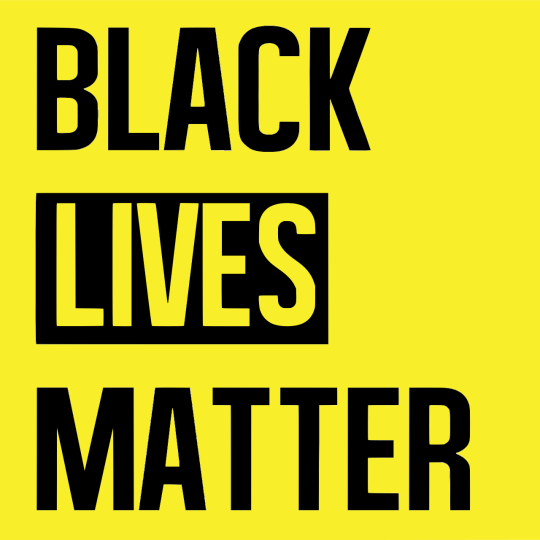
In this space, I usually share a few jokes and link to some of the pieces I’ve worked on in other internet places.
But things aren’t so funny right now. And my voice is not one we need to be listening to.
Black lives have been treated as less than for the entire history of this country. We’ve seen that from the very first moment that the United States became a country. We’ve seen that in the cases of George Floyd, Breonna Taylor, Ahmaud Arbery, Eric Garner, Stephon Clark, Philando Castile, and so many more, going on for far too long. We’ve seen that in our laws and our communities, in the redlining of suburbs and how, even now, black-owned businesses struggle to get approval for necessary payroll protection loans. There are two realities in this world, and your access and safety depend so heavily on the color of your skin.
So, rather than link to my work, I wanted to share the words of black players from the past few weeks. These are the voices that have been ignored or pushed aside to make people who look like me feel comfortable for far too long.
Gary Sheffield recently penned a piece in the Players Tribune about the racism and police brutality that he suffered first hand, and which -- during his playing career -- few wanted to hear about.
“So I ask you: Now do you believe me?
Because I stood alone then. But we stand together now – and that’s why I’m sharing my stories.For black people, these injustices are nothing new.
But for white people, people of privilege, this is revelatory. Their eyes have been forced open to view life through the same harsh lens as a person of color.”
The Mets’ Dominic Smith shared on Twitter how racism has impacted every day of his life, and that “Silence Kills.”
"As a black man in America you encounter racism on every level. Your parents prep you for it. They prep you for routine police stops. They prep you on how to talk to people with respect. When you have one strike against you [your skin color] you have to make the people you come across like you, and you do it with respect, with a smile, with love."
Giancarlo Stanton, Aaron Judge, Jackie Bradley Jr, Andrew McCutchen, CC Sabathia and more black MLB players came together to release a video where the players shared in one very important message:
“We’ve been told that our peaceful pleas were not made at the right time, in the right place, in the right way. We’ve been told to wait, but we remember when Dr. Martin Luther King Jr. warned us that the word wait has almost always meant never. We will wait no longer. We will make our voices louder. For all of us who can, and for all of those who could not.”
Braves Minor Leaguer Trey Harris joined the Effectively Wild podcast to talk about what it’s like to be black in America and in baseball, and the additional barriers players of color have to cross. Listen here.
Royals Minor Leaguer Nick Heath and Johns Hopkins third baseman Matt Ritchie went on the Baseball BBQ podcast to discuss the killings of George Floyd and Breonna Taylor, as well as how baseball can do a better job at being a more diverse and welcoming sport. Click here to listen.
Negro Leagues museum curator Ray Doswell recently gave an interview highlighting how far we’ve come, but also how far we still have to go.
“It's important to understand the history of it because none of these issues are new. These things have been happening for many, many decades. So you'll come here and you'll see some things that are mostly triumphant, but you'll see some things that you don't like, that should make you uncomfortable. Because it wasn't comfortable for those who had to go through it. And I hope that we're not overly romanticizing the story (of the Negro Leagues) too much. We're probably guilty of some of that. But there are folks who come in and get a sobering look at least at what that part of the story is, from roughly 1860 to 1960, and how that leads to the rest of the story.”
In The Athletic, retired baseball players including Ryan Howard, Jimmy Rollins, Dontrelle Willis, Doug Glanville, and Torii Hunter got together on a call to share their experiences. It’s a sobering look at just how different these worlds are, and it all comes down to if you’re black or white.
Jimmy Rollins said:
“Obviously, our white counterparts, they have a completely different view. They don’t have to grow up having that talk — and we all know what that talk is. They don’t have to get in a car, drive down the street knowing I didn’t do anything wrong, but this cop has been behind me for two blocks, something’s about to happen. They don’t have those fears. And every time something like this happens, as a player, you know exactly what is going on. When you get in the clubhouse, you do look at your counterparts, they’re going about their day as if nothing happened. And you’ve got three or four guys in the clubhouse looking at each other like, “Man. You see that? You know what that’s about. What can we do?” Then it’s four versus 21. It makes you a little uncomfortable.”
Negro Leagues President Bob Kendrick moderated a discussion on race in baseball with Josh Bell, Lorenzo Cain, Mychal Givens, Dwight Smith Jr., Taylor Hearn, and Delino DeShields Jr. Click here to view it. (I’ll also embed it at the bottom of the post.)
Jack Flaherty posted his thoughts on the ongoing police violence against black communities:
“The system continues to fail time and time again and nothing seems to change. Officers are not being held accountable for their actions. The badge and blue uniform are not a pedestal that puts a citizen of the United States of America above the law. The badge and blue uniform are there to distinguish those who are meant to PROTECT their communities, not terrorize and kill those that are meant to protect and serve. That being said, not all police officers are bad, but those who are not bad need to be speaking up about the injustices. Your voice needs to be heard. Your silence is speaking just as loud.“
If you’ve been out there protesting, stay safe. And if you haven’t, I hope you’ve done what you can, from reading, listening and supporting black voices to donating money.
Organizations that I’ve donated to include the Brooklyn Bail Fund, Black Lives Matter, and Black Visions Collective. But things have changed recently and there may be better places where your money can do more good at this moment. Here’s a piece from Vox that might help.
youtube
22 notes
·
View notes
Text
The Newest Bobcat in the Goal: A Spotlight on Grant Rollins Born and raised in Illinois, it’s hardly surprising that his return is drawing attention even before the season officially begins. Published 08/31/2019, Chicago Tribune—Sports By: Ian Rowe
It’s a sunny August day in Chicago, only a few short weeks from the opening of the Exy season, and Grant Rollins has obviously just come from practice. His jersey is emblazoned with Rollins on the back, but he still spells it out conscientiously for the women behind the counter as he orders his drink—a large black coffee with two extra espresso shots.
That extra caffeinated kick makes sense. These past few years, Rollins has surprised everyone by becoming one to watch on the court. He’s stoic and steady as he sits at the table, but in the goal, Rollins is a powerhouse with seemingly endless energy. Blessed with fast reflexes any goalie should envy and the knowledge of Exy to match, it isn’t any surprise the Bobcats were vying for Rollins in June.
But Rollins’ career didn’t begin here. In recent memory, Rollins led his former team—the Palmetto State Foxes, based in South Carolina—to qualify for back-to-back Class I Championships. Before that, he singlehandedly reinstated and captained the high school Exy team in Freeport, IL, only a few short hours from where he sits now. You can trace his highlights back over a decade, and yet it seems the best is still to come.
Rollins gracefully refuses the flattery though. “I’ve still got a lot to prove,” he says. “I’m only 24. This will be my first season as a pro player. I’ve got a long way to go and plenty to learn from the Bobcats.”
Maybe Rollins has been humbled by his former team. To hear some people tell it, Rollins barely made recruitment during his Class I run, and he made waves for all the wrong reasons his freshman year of college. As for the Foxes themselves? Despite their recent successes, they don’t carry the same illustrious reputation that Rollins himself does now. The numbers tell that story all on their own. Prior to Rollins’ tenure as captain, the Foxes hadn’t seen the Championships since Dan Wilds was captain.
That seems like it should be ancient history for Rollins now, especially when faced with his bright future, but to this day Rollins still refuses to speak ill of his old teammates. “The Foxes are a great team,” Rollins says, with what seems to be genuine loyalty. “I’ll always owe Coach Wymack for giving me a chance. I may not wear orange anymore, but I’ll be cheering them on from Chicago.”
The Bobcats’ red and white seems to suit him just fine too though. Rollins grew up near here, after all, and it seems like a kind of symmetry that he’s back now. That hometown connection has certainly earned him more buzz than some of the other new recruits for the Bobcats this year. Whether it was a strategic move or a nostalgic one, it’s done wonders for his burgeoning pro career.
“Of course, I used to watch every Bobcats game,” he admits, with perfectly timed chagrin. It’s clear Rollins’ has given his fair share of interviews, but it’s impossible to hold that against him. “I even had a Bobcats jersey as a kid. I wish I’d kept it.”
When asked to elaborate on his childhood, Rollins politely declines. He’s been spotted with his mother in nearby Freeport though, graciously signing autographs despite the somewhat complicated story of Exy there. Perhaps, like much of Rollins’ public history prior to adulthood, it’s better left unsaid.
It’s clear that Rollins is a local hero now, and it seems likely that his reputation will soon spread beyond his home state. After all, it’s only his first year with the Bobcats, and multiple sources have confirmed that Rollins can plan on plenty of time in the goal.
“We were lucky to find Rollins,” Bobcats’ Coach Clarissa Fowler said earlier this month, when Exy Digest asked her to provide insights on her new recruits for the 2019-2020 season. “He’s professional, eager to learn, and he puts the hours in. We’re going to have a great season.”
Time will tell if that’s true, but the Bobcats are set play their opening match against the Milwaukee Rams on September 4th. The Bobcats’ last few seasons have ended in disappointment, but if there’s one thing Rollins clearly knows after his time with the Foxes, it’s keeping a dream alive.
Rollins, for his part, echoes the same optimism as his new coach regardless. “The Bobcats are extremely talented and I’m fortunate to be here. I’m excited to see how far we go.”
#goodbye grant....sometimes i can still hear his voice....#self para#self para003#anyway here's what happened 2 grant post foxes! tl;dr he went PRO baybee
9 notes
·
View notes
Video
youtube
RTE Radio 2 Ireland - BP Fallon interview with George Harrison (18 Oct. 1987)
Photo by: Brian Roylance, Genesis Publications
This is an interview I’ve edited and uploaded to youtube because it’s quite long, and it was in two parts, so I’ve combined them together. You’ll notice at about 14:52 there’s a slight jump in the conversation which is where the second part begins.
I really love this interview. It’s one of - if not my favourite interview he ever did. I strongly suggest you give it a listen. Similarly to the Swedish Fan Club Tape, George is extremely calm and open, and Irish DJ BP Fallon asks refreshing questions. BP Fallon has himself had an interesting life, and at one point worked at Apple for Derek Taylor (You can also see him miming the bass in the Instant Karma Top of the Pops video). I’m guessing this related to why George felt relaxed. I hope you enjoy it.
Below I’ve included the written version of this interview by BP Fallon for The Sunday Tribune. It has some information not available in the audio (not sure if it simply wasn’t recorded, or if there’s another version which includes the full conversation):
"Sometimes it feels like another world, another life, some previous incarnation," George Harrison says. "I view it a bit through a haze but, y'know, people don't ever stop talking about it so it's hard to got too much distance between myself and The Beatles."
George Harrison doesn't mind that, not anymore. "I used to," he admits. "I used to not like it at all. I wanted to be free of it. Now I've learned to live with it. And also, don't forget, there was a period when The Beatles split up and there were all kind of court cases and bad vibes and stuff and that left a bad taste in the mouth for a while but after the years it's all cleared up, everybody's friends again."
He's sitting in a little office in the house owned by his company Handmade Films, just off Cadogan Square in Knightsbridge in London, a few streets behind Harrods. Fourty-four-years old this man is, he has a bit of a beard and his shortish hair is swept back and there are new lines on his face. He drinks coffee and smokes ciggies and when you sit talking to the geezer you can't help but feel warmth for him.
As one of John, Paul, George And Ringo, The Fab Four, as a member of the most popular, the most inventive, the most influential rock group of all time, he has gone through one of the strangest trips ever. They were Gods once, The Beatles. And sitting here now, George Harrison comes across as a normal bloke.
He was born in Liverpool, the fourth child of Harold and Louse Harrison. George's father was a bus driver - before that, he had been a ship's steward on the White Star Line for ten years and from one of his travels in America had returned with an old wind-up gramophone and records by bluesman and yodeller Jimmie Rodgers and country singer Hank Williams. Young George was smitten. He listened to skiffle, people like Lonnie Donegan and songs about the Rock Island Line. And then he heard Elvis Presley singing Hearbreak Hotel. "It came out of somebody's radio," George Harrison says, gazing out the window at the autumn light fading behind the trees, "and it lodged itself in the back of my head. It's been there ever since."
At the age of 13, for £3, he bought his first guitar. Two years later, Paul McCartney introduced George to his friend John Lennon (George - "this snotty-nosed kid" as Lennon recalled). George joined John and Paul in their skiffle group The Quarreymen. In 1962, when George was 19, John, Paul, George and their new drummer Ringo Starr made their first record together. It was a fresh-sounding bluesey pop record called Love Me Do and they now called themselves The Beatles.
They changed the world, these four Scouse moptops making new noises and singing about wanting to hold your hand and about walruses and about revolution and all you need is love.
And for eight years The Beatles were bigger than Jesus.
For a while, The Beatles - at very least by example - endorsed smoking dope and taking LSD. John, Paul and George were each busted at least once for breaking the cannabis laws. "A lot of the stuff that happened..." - and then George brings himself up to the present tense - that happens, it's just like when Prohibition was on. If they make a big deal about stuff it becomes bigger than it actually is. In moderation... you have to have moderation in everything. The worst drug of all is alcohol... it actually kills more people then heroin." He says he was fortunate as a kid to see a film about the trumpet player Chet Baker, about Baker's heroin addiction, "and that and maybe something else made me aware that this thing was just too much.
"Of course, the other things, the psychedelic drugs, are much different because they don't put your body in a stupour, they sort of..." and now he's laughing... "they sort of catapult you out into the universe. It's a totally different perspective." Then his voice is serious again. "These things obviously can be very dangerous too. I'd hate to have some right now because I don't think I could handle it. It just gives you too many things to think about all at once."
Love and peace went out the bathroom window when The Beatles split in 1970, with Paul McCartney publicly announcing he had left. George says he realised The Beatles weren't shaking a couple of years before that. "Everyone was just getting all uptight with each other. The new wives were coming in and, y'know, living under the piano and there was no privacy anymore for us as far as the group was concerned in what was normally the only privacy we ever had, the four of us when we got into a studio. And we'd just grown away from each other. One time or another every one of us left that group before we finally stopped."
George left during the making of what would be Let It Be. Ringo left another time "and went on holiday, and John was always wanting to leave and Paul too. You know, it was too much pressure and we'd been through those years. It was just too much.”
He emphasises that the remaining three Beatles are good pals, now. "Paul and I went through a shaky period but we're okay, now. All the old aggravations have passed a long time ago. There's no reason not to be friends."
By 1971 George Harrison was the most successful solo Beatle, with his triple album All Things Must Pass and the enormous hit My Sweet Lord. Four years later his single Ding Dong Ding Dong - a record even worse than McCartney's Mary Had A Little Lamb - was the first release by a solo Beatle to fail to enter the charts. Several years later a court ordered him to pay £260,000 damages for plagiarising the Chiffons' song he's So Fine with My Sweet Lord. That Harrison had modeled My Sweet Lord on another song, the gospel Oh Happy Day by the Edwin Hawkins Singers, was bad enough. That he had to pay the money to his former manager Allen Klein - "a looney who didn't take care of business" George describes him now- because Klein had scooped up the publishing of He's So Fine... that rubbed salt into the wound.
His career and also his marriage to his first wife Patti Boyd were in pieces. Patti had gone to live with George's close pal Eric Clapton, who had written Layla about his best friend's wife. George started drinking heavily, contracting a serious liver complaint that his friends feared might be the end of him.
George's chum Eric Idle had found it impossible to raise the necessary finance to make the Monty Python film Life Of Brian, so George chipped in with half the required money, £2,250,000. It turned out to be one of the best investments George had ever made, reaping a profit of more than £30,000,000. Since then, Harrison and his film company Handmade Films have scored with another Monty Python film The Meaning Of Life - banned in Ireland - and delivered films like Time Bandits and Mona Lisa as well as Shanghai Express, a disaster for its stars Sean Penn and Madonna and its producer Harrison. But what the heck. George isn't short of a few shekels.
In 1978, George married Olivia Trinidad Arias, a 27-year-old who had been born in Mexico and had been working as a secretary in A&M Records in Los Angeles. George's health had been desperate. He was fading away. Olivia contacted the Chinese acupuncturist Dr. Zion Yu and within weeks of treatment George had regained his energy and his spirit.
They have a nine-year-old son named Dhani - the Indian for wealthy - and the other day he asked his father to make him up a cassette of Chuck Berry songs. After George appeared at the Prince's Trust concert in London five months ago with Ringo, Eric Clapton and Elton John, Dhani came backstage. George had sung his own Beatle compositions While My Guitar Gently Weeps and Here Comes The Sun. "I asked him 'What did you think?' and he said 'Uh, you were alright Dad, but why didn't you do Chuck Berry songs like Roll Over Beethoven and Johnny Be Good and Rock'n'Roll Music?'"
He has a new LP out any day now, his first in five years. It's called Cloud Nine. "Have you heard the album?" he asks solicitously. "No? I'll see if someone's got a copy." George Harrison wanders off, and returns with a young woman who says "It's a bootleg I taped from the CD." George flips the cassette into the music system and spins it through, looking for a specific track. "I think you might like this one," he says in his dry Liverpudlian drawl, settling himself into another chair as he watches for reactions.
Ringo's drums with cellos straight from Lennon's I Am The Walrus lead into George singing with fondness for former Beatle times. It's a track that could fit on a Beatle record and it's called When We Was Fab. "Fab... but it's all over now baby blue" George sings, and at the end there's sitar sounds like George cosmicing out on Sgt. Pepper. It's... well, fab.
When John Lennon was murdered in 1980, George Harrison didn't suddenly lock himself away from the world in his Gothic mansion. Near the riverside town of Henley-On-Thames, this bizarre 70-roomed palace called Friar Park was remodeled a century ago by the eccentric Sir Frankie Crisp and is set in 33 acres of parkland with three lakes with secret stepping stones so one can appear to walk on water, underground caves linked by a river and a reproduction of the Alps that includes a perfect 100 foot high replica of the Matterhorn. George was already in hiding.
"I was already trying to hold onto some sort of privacy. I think everyone needs to have a bit of space, y'know. I mean, if you were just being mobbed and on the TV and that all your life you just turn into a loony, and long before John got shot I was already just digging in the garden, planting trees and just trying not to go on television, just having a bit of peace.
"But what it did, it affected me probably like anyone who loved John and who grew up with him and his music. And it was a very sad thing and, um, it didn't make me feel..." Harrison's voice trails off, and for a moment his eyes look away and he's lost in private thoughts. He looks back. " It made me wonder about ever gettin' into situations where there's fans, although at the time you can't blame fans for that. There's one loony in every crowd, I suppose. But I go on living normally. I don't panic unnecessarily."
There was talk that for Live Aid Paul, George, Ringo and Julian Lennon might let it Beatle together, but George dismisses any idea of reunions. "I don't think we'll play together. The Beatles certainly can't play again and I think it's best left as it is, y'know."
Long before Live Aid, George Harrison's Concerts For Bangladesh raised £45,000,000 for the starving. He didn't appear at Live Aid but says if he'd known more about it "maybe I would have done it but they did alright without me." George talks at length about the planet, his concerns about destruction. Last year he participated in an anti-nuclear rally in Trafalgar Square, and he's a member of the ecological organisation Greenpeace. "I love those people because they go out and actually do it. I mean, if it wasn't me that's the kind of thing I'd like to be, out there on a ship getting harpooned by Russians and Japanese."
At the turn of the Seventies, George became a benefactor to the Hare Krishna movement. He not only made records with them and talked about them publicly but also forked out a quarter of a million pounds to buy them a 15-room Elizabethan mansion with 17 acres of land.
Since then, George's friend His Divine Grace Guru Bhaktivechanta Swami, the leader and founder of the International Society For Krishna Consciousness, who was 77 when they met, has died. George feels that some of the remaining Krishnas have at times abused his patronage, and he cites letters from people who wrote saying that they were hassled at airports by devotees using Harrison's name.
Nevertheless, he still subscribes to "the Swami's ancient Vedic way of having God consciousness. The technique of chanting, just like the monks and Christians, they do it too really but it's just using beads and chanting these ancient mantras... they do have great affect. I wouldn't knock them at all. I am always a bit dubious about organisations and since the swami died it does seem to be chaotic, with all kinds of guys thinking they're the gurus. To me, it's not important to be a guru, it's more important just to be, to learn humility." And George still chants. "I've still got my bag of beads and they're really groovy now, all polished up."
Is he a happy chap? "Yeah, I'm okay. Sometimes I get depressed. It's a constant battle, isn't it? You have to consciously make an effort to be happy and considering everything, I've come along quite nicely. There's always room for improvement but, um, I have a laugh and I feel quite good about things." He believes in reincarnation. "The only reason we're actually in these bodies is to learn and develop love of God and liberate our souls from this round and round, the Memphis Blues." He reckons he'll come back again. "Well," he says laughing, "by the look of things I'll probably have to... but I'd like to give it a pass one of these incarnations!"
And, George Harrison, what would you like to be remembered for?
He pauses. "I don't know... I don't know." And then he smiles and looks you directly in the eyes and you see the face of a man still searching, still looking to extend his gentle vision for all time. He'd like to be remembered, he finally says, "just as somebody who's not bad, not that bad”...
"That'll do, yeah."
Fair play to you, George.
#george harrison#bp fallon#john lennon#paul mccartney#ringo starr#the beatles#rte radio 2 ireland#cloud nine#bob dylan#traveling wilburys#1987#concert for bangladesh#dhani harrison#olivia harrison#allen klein#gary moore#mo ostin#brian roylance#audio#eric clapton#pattie boyd#paul and george#george and john#george and ringo#carl perkins#jimmie rogers#hank williams#lonnie donegan#elvis presley#eddie cochran
57 notes
·
View notes